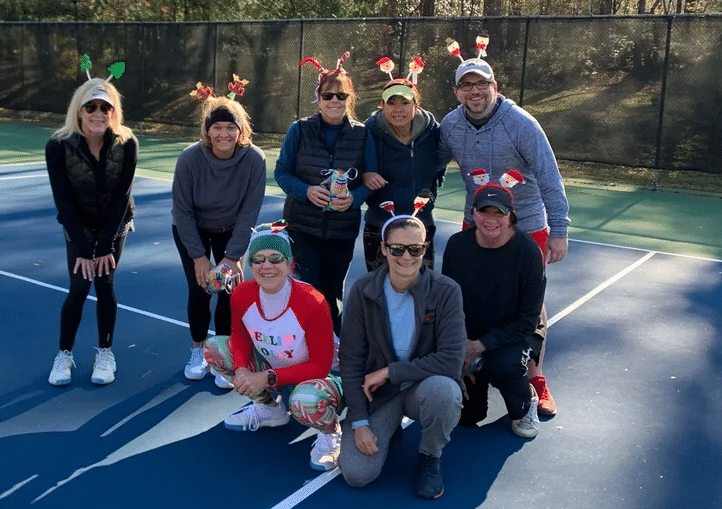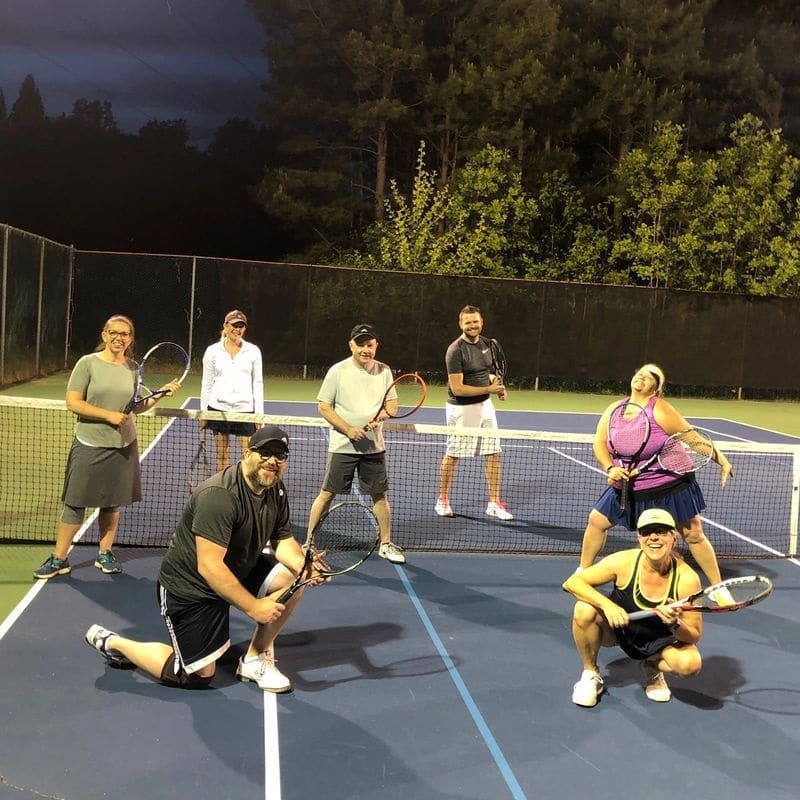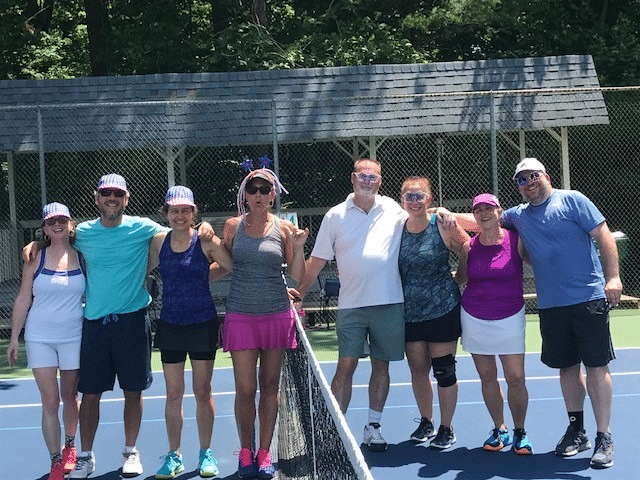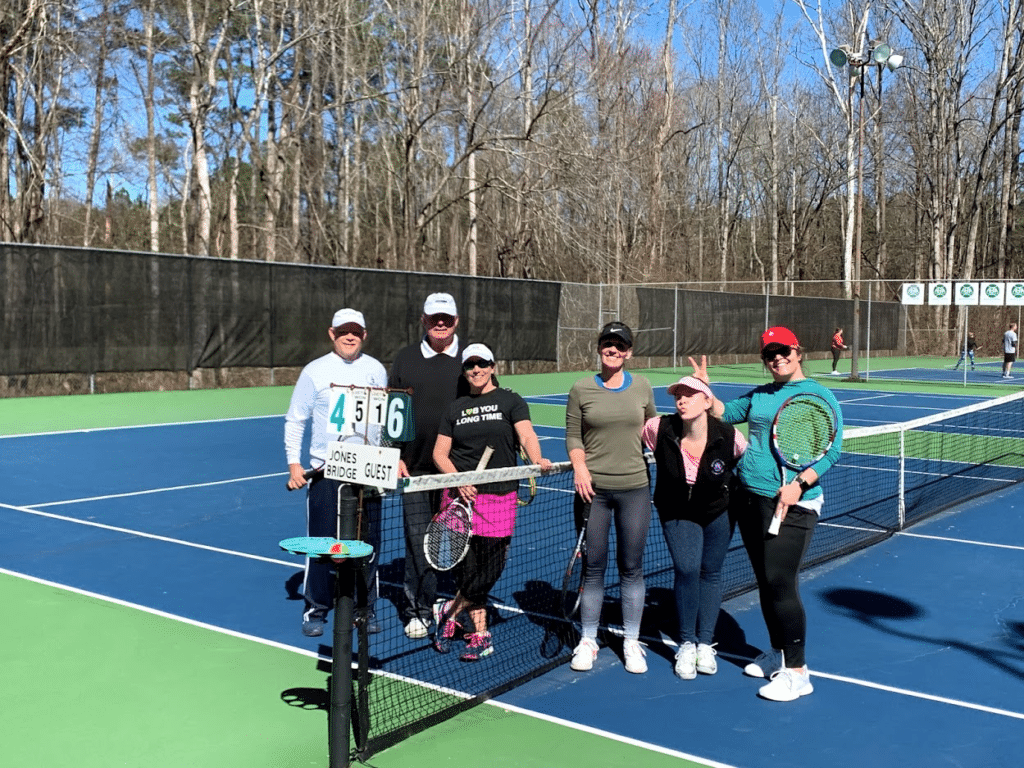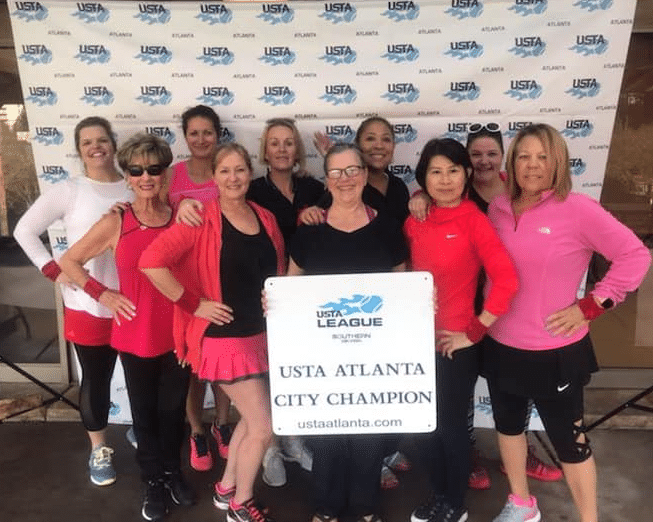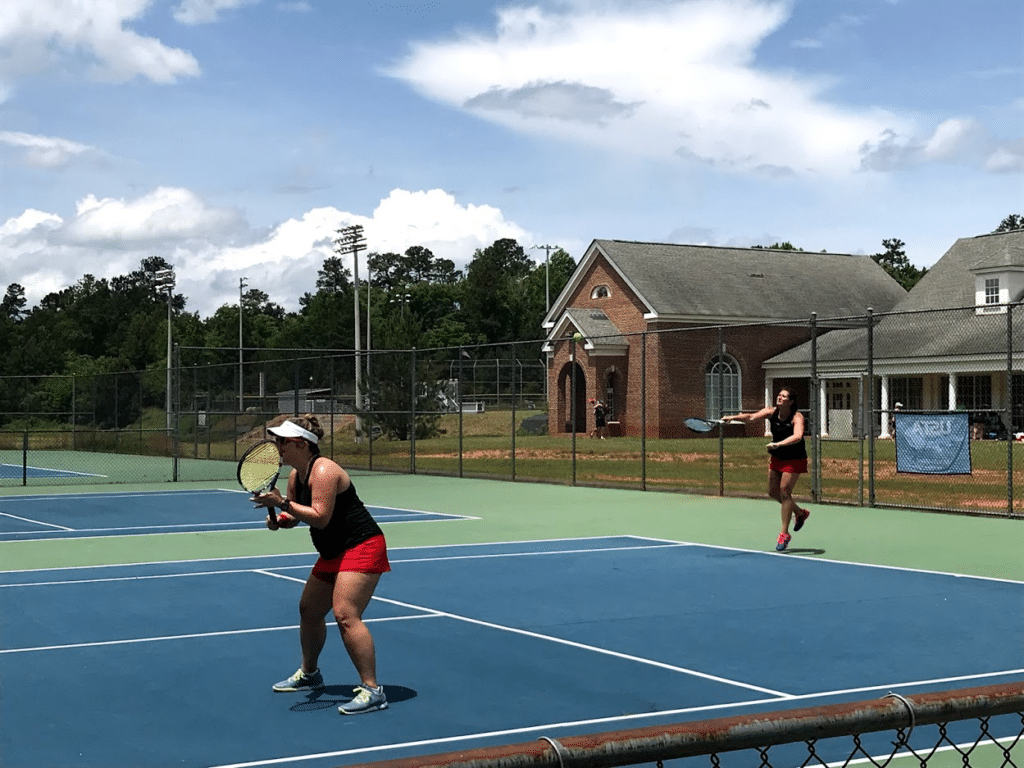Sports
Tennis Anyone? The Vibrant Tennis Scene in Peachtree Corners
Published
3 years agoon
By
Kelsey Asher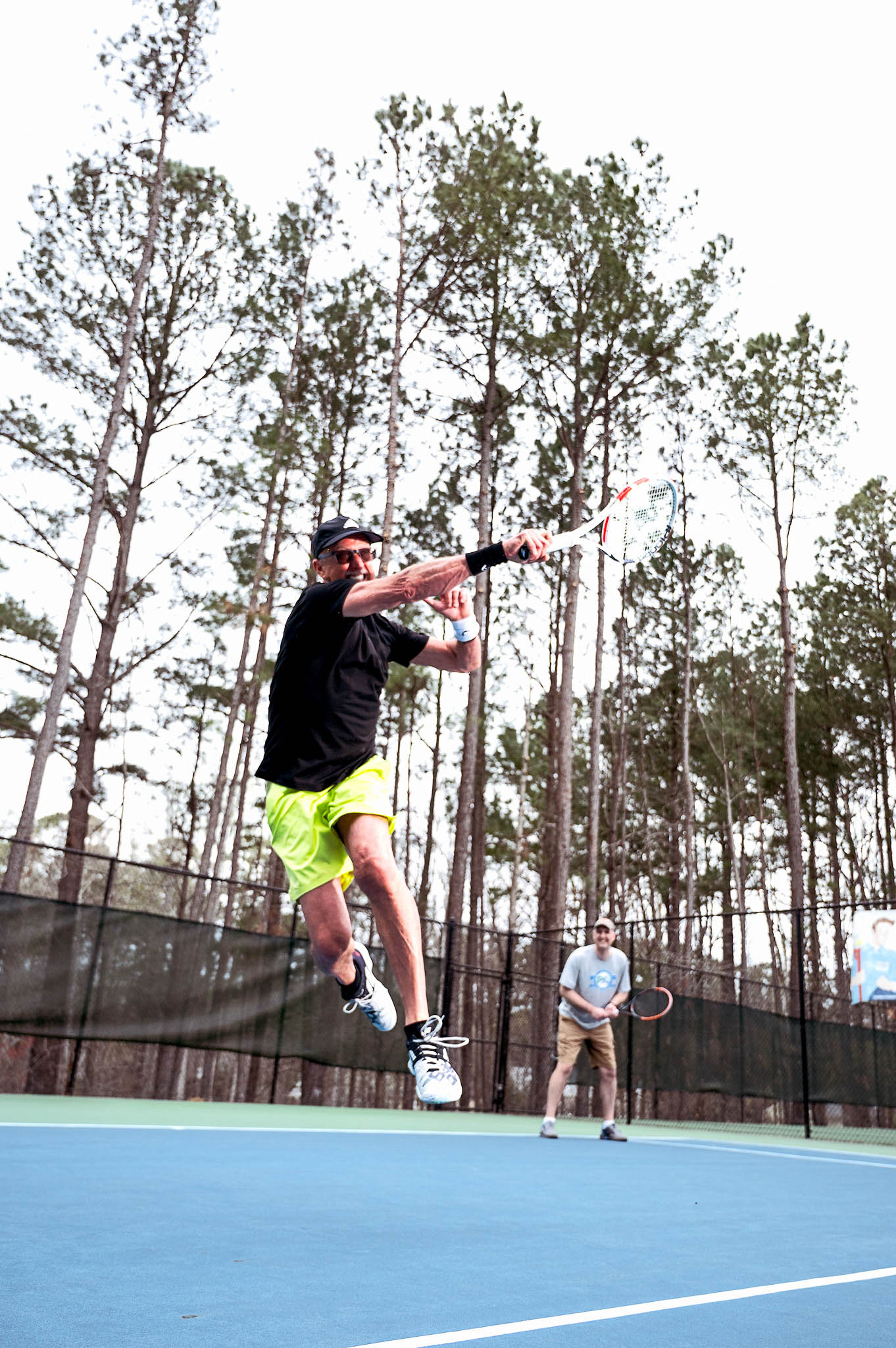
It’s time to get into the backswing of things. For tennis lovers of every age, stage and skill level, there is a place in Peachtree Corners to pick up a racquet.
Where to Play
Peachtree Corners Swim & Racquet Club
People make quite a racquet about Peachtree Corners Swim & Racquet Club (PCSR) because of the vast amenities it offers member families for recreation, quality exercise and more. It boasts four lit tennis courts with covered seating areas on each side, reservable through their website or app. Other features include a six-lane junior Olympic sized pool, playground, ping pong table, tetherball court, basketball court, volleyball court and a seasonal pavilion.
There are many teams that compete out of PCSR, in the respected tennis organizations of Atlanta Lawn Tennis Association (ALTA) and United States Tennis Association (USTA). This spans to adult men’s and women’s teams, as well as mixed doubles. Teams are open to club members, but non-club members can play out of the club for an additional fee.
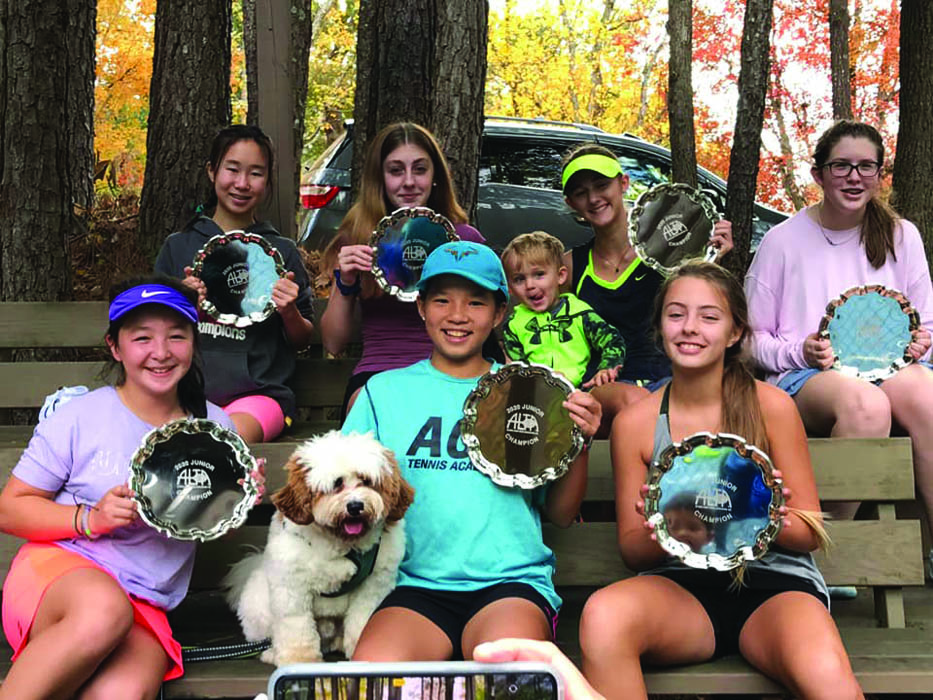
“Peachtree Corners has a vibrant tennis community across multiple clubs and neighborhoods, so you don’t have to travel very far to get a match in,” PCSR Membership Chair Sonny Pieper said.
Tennis is a social sport with a broad appeal, bringing people from all walks of life together to work out and have a blast. PCSR Tennis Chair Ryan Corley first joined a weekly Sunday women’s team for beginners, before eventually stepping to a leadership role.
“I only started playing tennis myself the last three years, because there was an opening advertised for a beginner’s team out of our club. It was a great way to get to know people and to get to learn the game more and to foster that team spirit,” Corley said.
For more information, check out peachtree-corners.org.
Jones Bridge Swim and Tennis
Jones Bridge Swim and Tennis Club boasts a saline pool and 6 lit tennis courts for year-round play. All 6 courts will be resurfaced at the beginning of May and will include pickleball and kids lines.
The club offers weekday and weekend teams across all levels of skill for ALTA and USTA. They have five to six teams for ALTA Mixed Doubles and four Men’s and four Women’s Doubles teams. Often they have one or more teams in playoff contention. Many players also play in flex leagues out of the club.
Their tennis pro, Courtney Allen, offers team drills, private, semi-private, group lessons and a juniors academy.
Another unique feature the club offers is cardio tennis which is available to both members and nonmembers. Cardio tennis combines tennis and fitness with music – classes are held Monday evenings and Friday mornings.
Jones Bridge Swim and Tennis also hosts fun tournaments every month including round robin mixers and triples tournaments. For more information on Jones Bridge STC tennis, visit jonesbridgeclub.com/
The Club at Spalding Corners
This active neighborhood’s club offers four courts to its members. Both of their mixed teams won in their respective divisions this year and, in fact, one of their mixed captains is the second longest running captain in ALTA history, according to President of Spalding Corners Neighborhood Association (SCNA) Megan Powell.
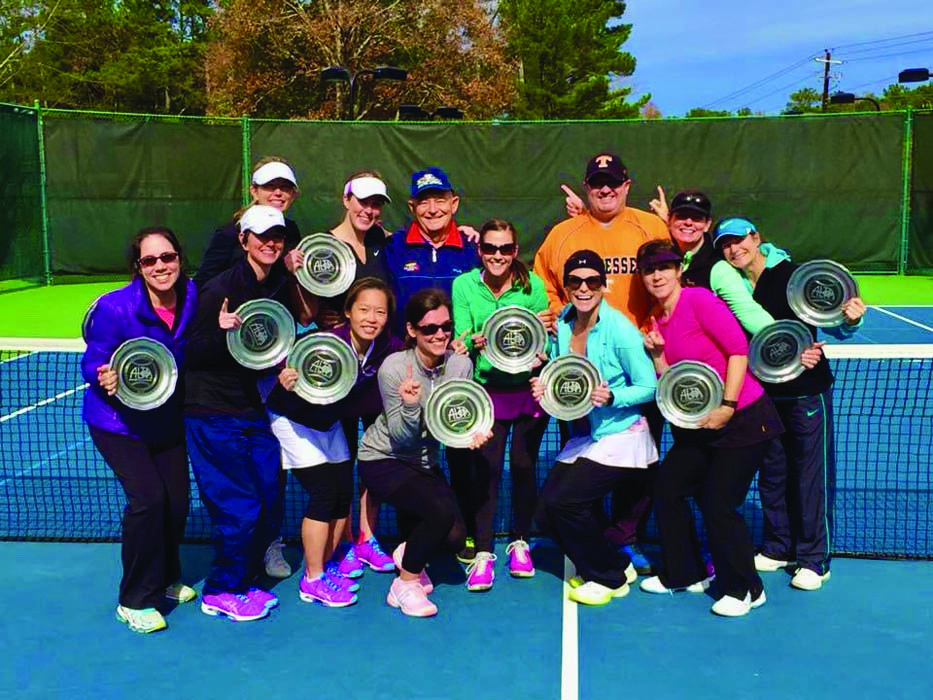
“Tennis is the best sport ever! It’s a great social sport, and to be competitive and compete at all ages is so great,” Powell said.
SCNA Tennis Chair Christina Stolte has been playing for roughly 21 years, starting about a year after moving into Spalding Corners. She also served as the former HOA president and now serves as the Grounds Committee Chairperson.
Stolte, who is instrumental in coordinating all things tennis at The Club in Spalding Corners, is quick to point out all the great opportunities for play — singles, doubles, mixed doubles, tournaments and more. Two years ago, the club hosted a triples tournament for members and guests to try a unique and different form of gameplay. The SCNA also offers tennis pro coaches for lessons and summer camps, as well as kids’ play.
The club is voluntary membership for residents of Spalding Corners, but it also allows non-residents to join for dues of $685 for families and $485 for adult individuals. Standard operation hours are 9am to 5pm, Monday through Friday, according to their website.
In addition to its tennis offerings, The Club at Spalding Corners also has a lovely pool that has recently been resurfaced. It serves as the home base for the Spalding Corners Sharks, who ranked first place in Gwinnett County Summer Swim Leagues.
Peachtree Station Swim & Tennis
Peachtree Station Swim & Tennis Club (PSST) has eight LED-lighted tennis courts and two full-time certified United States Professional Tennis Association (USPTA) and United States Professional Tennis Registry (USPTR) tennis professionals on staff. Offerings include group, semi-private and private lessons, summer/holiday tennis camps, cardio tennis, tournaments, racket stringing and demos. The variety of levels of ALTA and USTA teams for men, women, children, seniors and mixed doubles out of PSST runs the gamut.
For those of us who really want to get the most out of every swing, it sometimes takes a savvy coach to motivate and teach us. That’s where a hardworking athlete comes in, like Joe Rahme, one of the tennis pros who works within PSST and Peachtree Corners Swim & Racquet. He puts his players through their paces, often instructing over several courts at once to make sure they’re getting the attention they need.
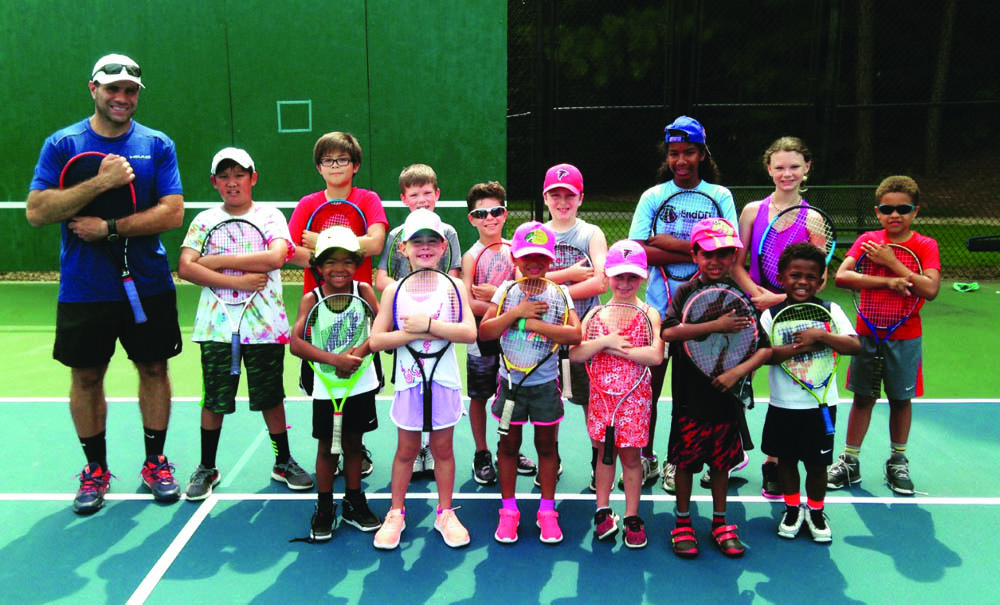
“Probably the most satisfying thing is just seeing everyone improve,” Rahme said. “I’ve had some players come is as complete beginners. They have never even played the game, and then over the year they become really good. And that is the most satisfaction I get.” Rahme also remarked that often tennis is a main source of exercise for people who go into the office (or work from home), so he makes sure they get a good workout.
“We believe that tennis is the ideal sport for a number of reasons,” PSST Club Manager Lise Weaver said. “Tennis is a sport that can be played for a lifetime. At PSST, tennis provides our members an opportunity to socialize and meet new people, and we even offer things like cardio tennis for those looking to use tennis as a way to get or stay in shape! Not to mention, tennis is relatively inexpensive and is a low injury sport.”
The Fields Club —Amberfield, Riverfield and Linfield
The Fields Club encompasses 50 acres of land between the Riverfield and Amberfield neighborhoods, much of that in view of the Chattahoochee River. It’s a mandatory membership community for residents, and it’s also open to outside members for access to its recreational programs, two pools, upcoming permanent pickleball courts, walking trails and 16 tennis courts. It’s interesting to note that they have the most tennis courts of any HOA Swim and Tennis community in the area.
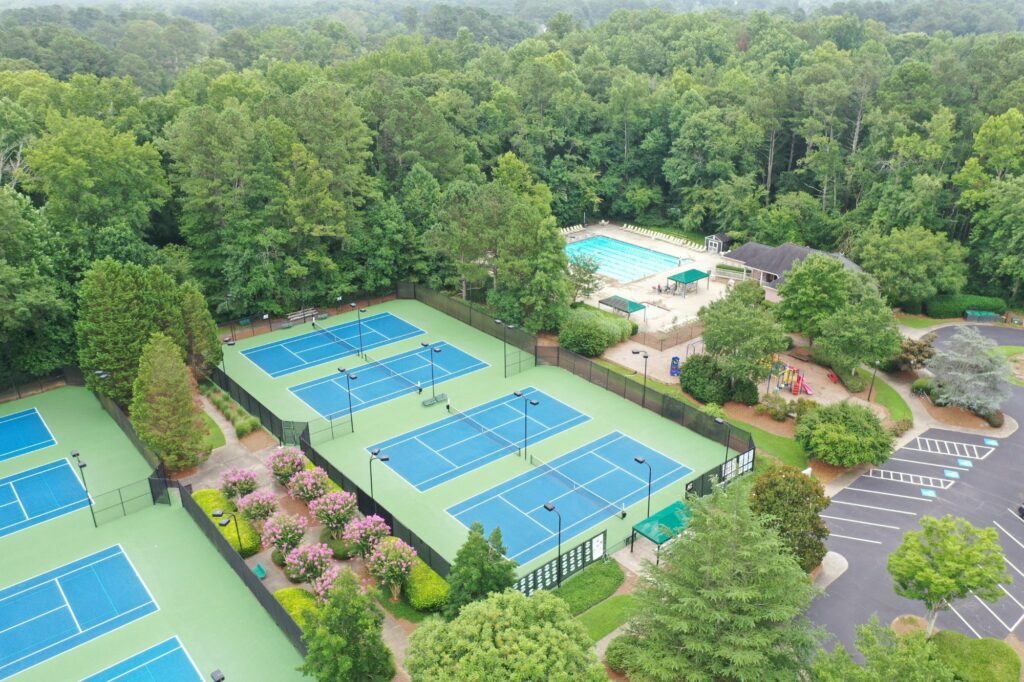
Ace Tennis Academy, under Ace Tennis Management, has operated in the area for 25 years and has been with Fields Club since 2015. There are seven full-time on-site coaches on staff, and there tends to be 15 to 16 adult teams active in ALTA or USTA every season. There is ample opportunity for summer play and programs for all ages and abilities. The junior tennis program spans from introductory tennis to kids who are top players in the country.
“To give you a little history, we have had eight players who have hit number one in the country over the years, and a pretty solid number of kids who have gone on to play college tennis,” Tennis Director Jeff Weaver said.
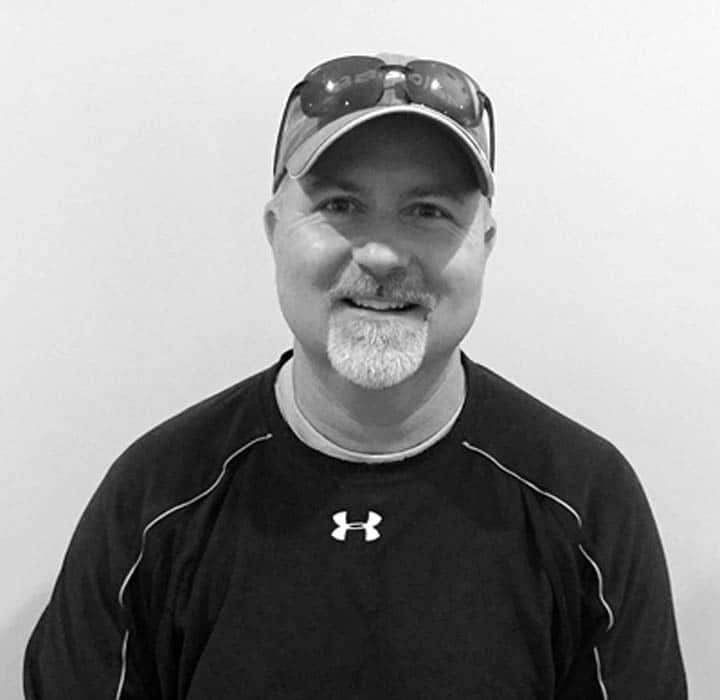
Ace’s team of tennis pros provides all the programming for the club “and the competitive part of the academy just kind of sits on top,” Weaver added.
For information on the Fields club, visit fieldsclub.com or email membership@fieldsclub.com.
Greater Atlanta Christian School Tennis Academy
In addition to its educational value, Greater Atlanta Christian School (GAC) has a unique asset in its tennis academy that allows students to receive tennis instruction as a PE elective or free period alternative during the school day.
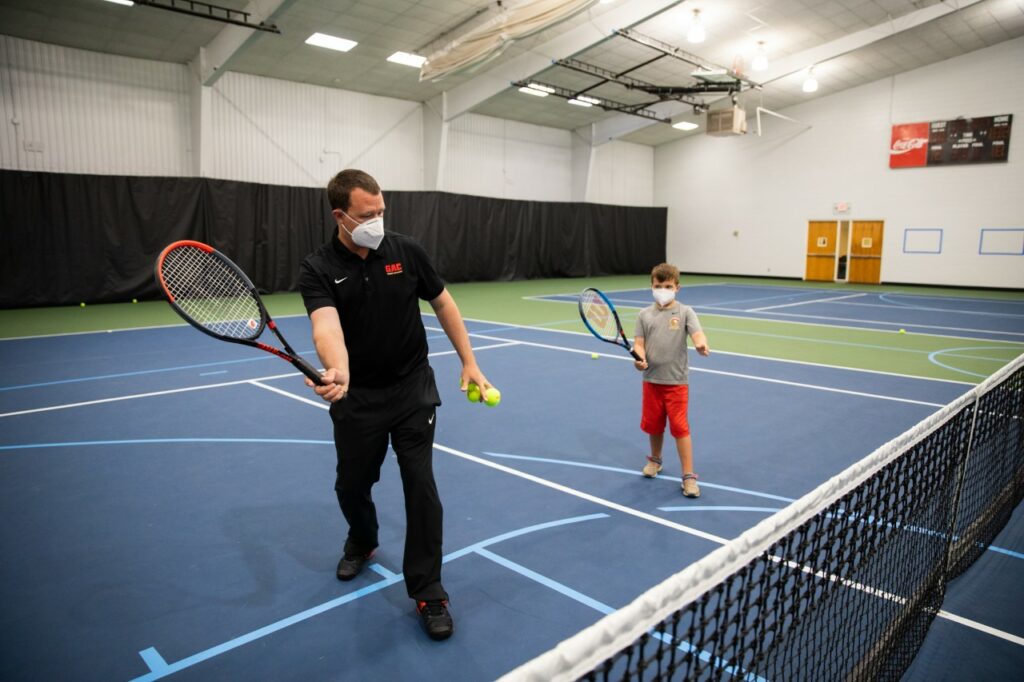
With six outdoor courts and two additional indoor courts, there is plenty of room for kids to play. It’s worth noting that GAC is the only school campus in the state of Georgia to have indoor courts. The courts are within walking distance for students who participate in the tennis academy during school hours, so middle and high school players can walk over freely; elementary play is limited as younger children require an escort.
GAC Tennis Academy is a fully functional tennis academy that has operated within the school since 2017, with tennis professional staff accredited with USPTA and USPTR tennis coaches, professional organizations and USTA high performance certified coaches. Many of their tennis pro coaches have a trophy case full of awards and accolades, including Scott Hutchinson’s and Rocky Warner’s 2019 USTA Facility of the Year and 2020 USPTA Industry Excellence awards.
The academy is not a separate entity from the school; it’s completely integrated under its athletic arm. Similar school programs typically bring in an outside organization to provide such specialized programs, but GAC made a point to construct a new kind of leadership.
“We were very intentional in setting up GAC Tennis Academy as a direct part of the school instead of a separate group so we could be connected to the students and help them to succeed in the sport,” Hutchinson said.
Per scholastic sports regulations, the GAC Tennis Academy does not coach the GAC school tennis teams in any way and are not allowed to be present at practices. Student players can participate in camps and private lessons, however, and many do.
GAC Tennis Academy welcomes outside players from other schools for after-school programs, and also works with adults in USTA and ALTA. The academy will be part of GAC Grow Camps this summer. For more information, visit greateratlantachristian.org/athletics.
Life Time Athletic and Tennis Peachtree Corners
Life Time Peachtree Corners has 28 total tennis courts — 16 outdoor hard courts, 4 clay courts and 8 indoor tennis courts. They recently partnered with Academia Sánchez Casal to offer a junior academy for high level junior tennis players. Then there is the SMART Junior program, a junior development program that offers classes for ages four and up.
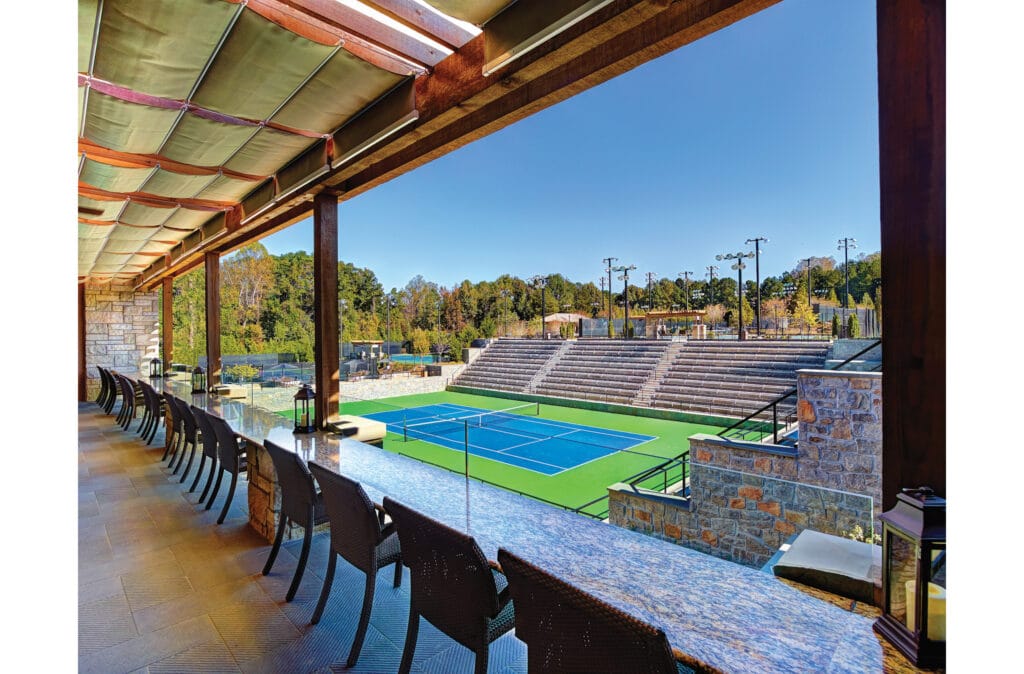
“Our innovative SMART programming focuses on fun and athleticism first, with tennis skills coming second,” said Lifetime Public Relations Specialist Dan DeBaun. “We also offer a Play, Learn, Love Program — this is our beginner pathway for adults.”
Additionally, Life Time Peachtree Corners offers in-house leagues, mixers and tournaments for all levels, as well as ALTA and USTA League play. For anyone looking for one-on-one instruction, private lessons with USPTA and PTR certified professionals are available.
Find out more about life at Life Time at lifetime.life.
USTA and ALTA: A Primer
Here is a general overview of the Atlanta Lawn Tennis Association (ALTA) and United States Tennis Association (USTA) sports organizations, which set the standards and organizational structures of competitive tennis in the U.S.
The USTA Southern office is located in Peachtree Corners, though their influence and authority reach much further.
“USTA Southern is one of 17 USTA sections. USTA Southern is the largest, with 25 percent of the national membership,” explained USTA Southern Communications Director Ron Cioffi. USTA Southern covers Georgia and also included Alabama, Arkansas, Kentucky, Louisiana, Mississippi, North Carolina, South Carolina and Tennessee.
“USTA Southern acts as a regional office, even though we are called a section,” Cioffi continued. “Each of our states is considered a district. Local tennis play is organized by community tennis associations (CTA). USTA Atlanta is the local CTA and covers much of metro Atlanta.”
ALTA’s office is located in nearby Roswell and has much in common with USTA. They are both non-profit or not-for-profit organizations dedicated to maintaining the rules of play and sportsmanship. ALTA is also affiliated with USTA through membership in the Southern Tennis Association and abides by the USTA rules of tennis and code of play.
The main difference between the two, if any, is simply ALTA’s focus on play in the Metro Atlanta area. But if you play adult tennis locally and competitively, chances are high that any team you join would be under one of these two umbrellas.
*This article has been updated on April 12, to include information from Jones Bridge Swim and Tennis
Related
Kelsey Asher is a proud graduate of the University of West Georgia with a Bachelor’s in Communications. She has held a variety of marketing leadership roles for several small, startup companies in a variety of industries including publishing, construction and technology.

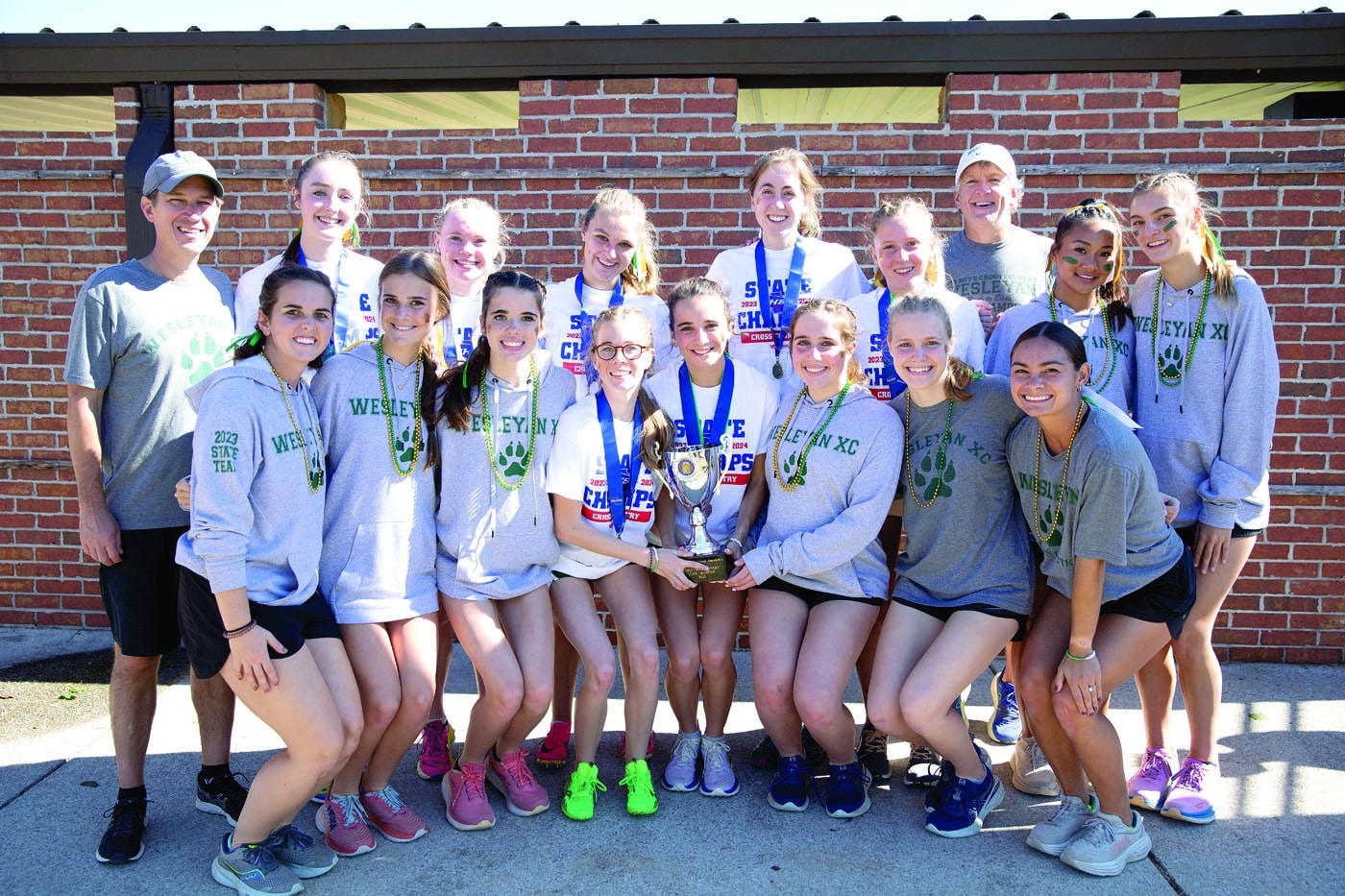
Wesleyan School is known for its faith-based academic excellence, but maybe you didn’t know that the school’s athletic achievements are just as impressive. This year alone, Wesleyan has amassed an astounding nine state championships.
“The Wesleyan School athletic program has been incredibly blessed to enjoy a significant amount of success during the 2023-2024 school year. Winning nine state championships is a credit to our student-athletes, coaches, and parents,” said Chris Cleveland, head of school and assistant coach for the varsity boys basketball team.
Nine state championship titles are the most Wesleyan has ever won in a single school year. But the school’s athletic department is focused on far more besides winning.
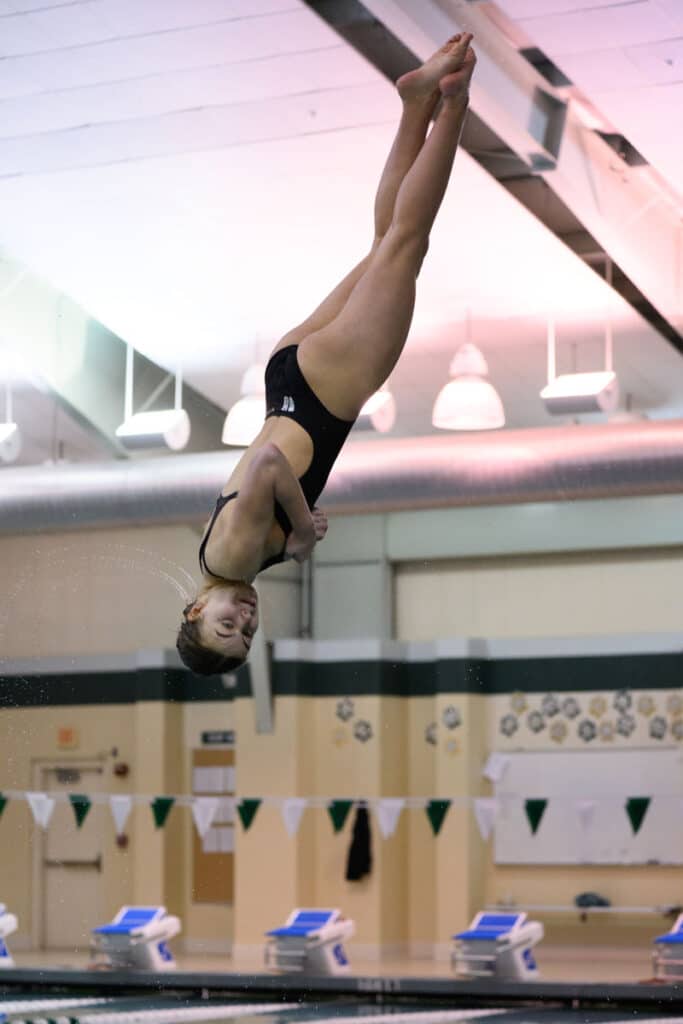
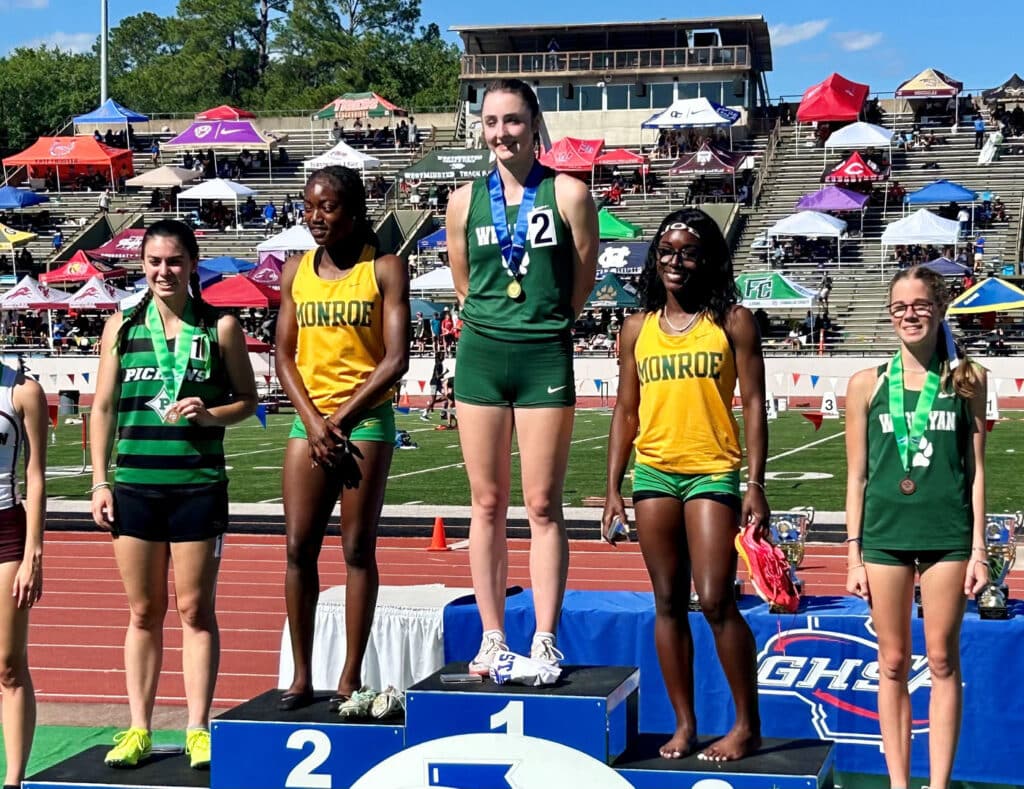
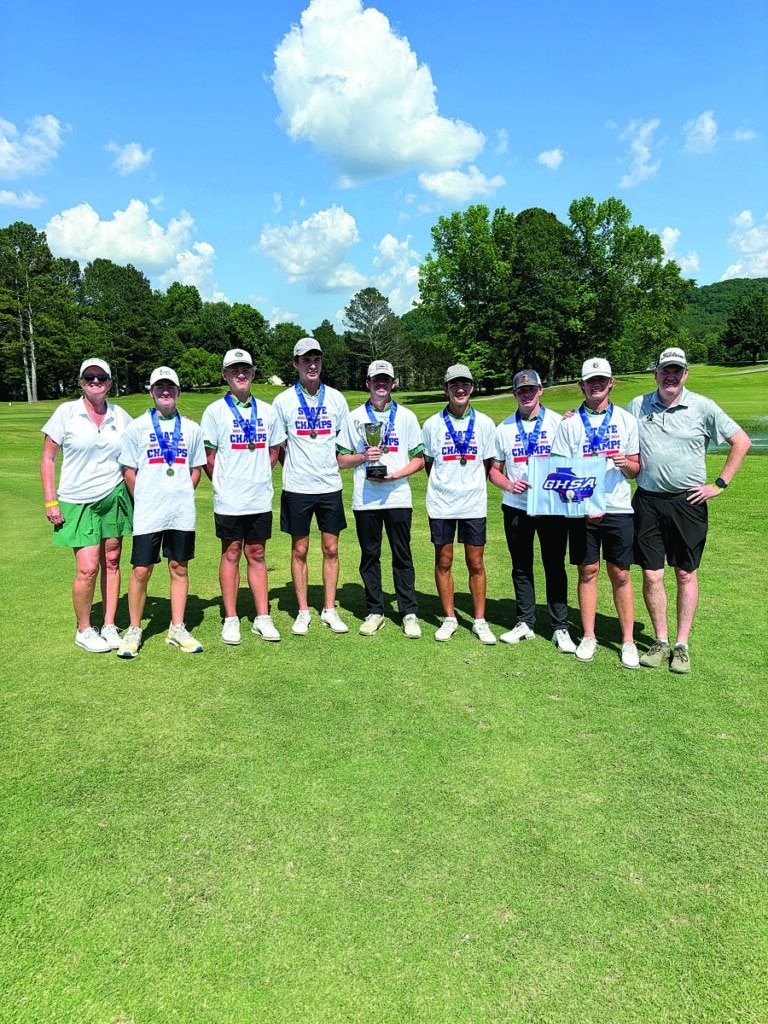
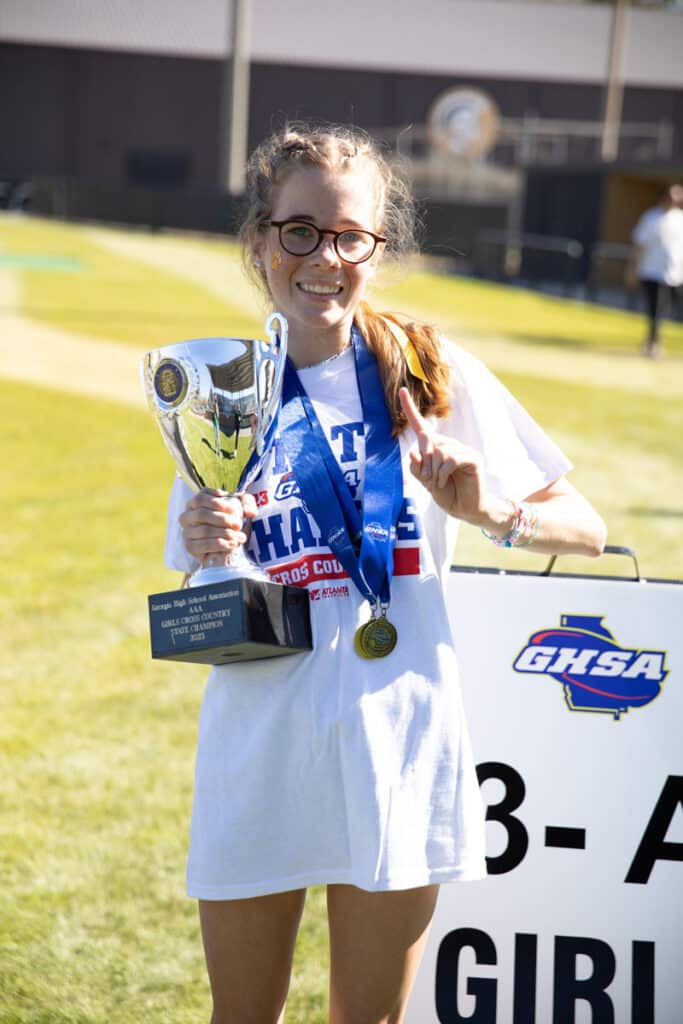
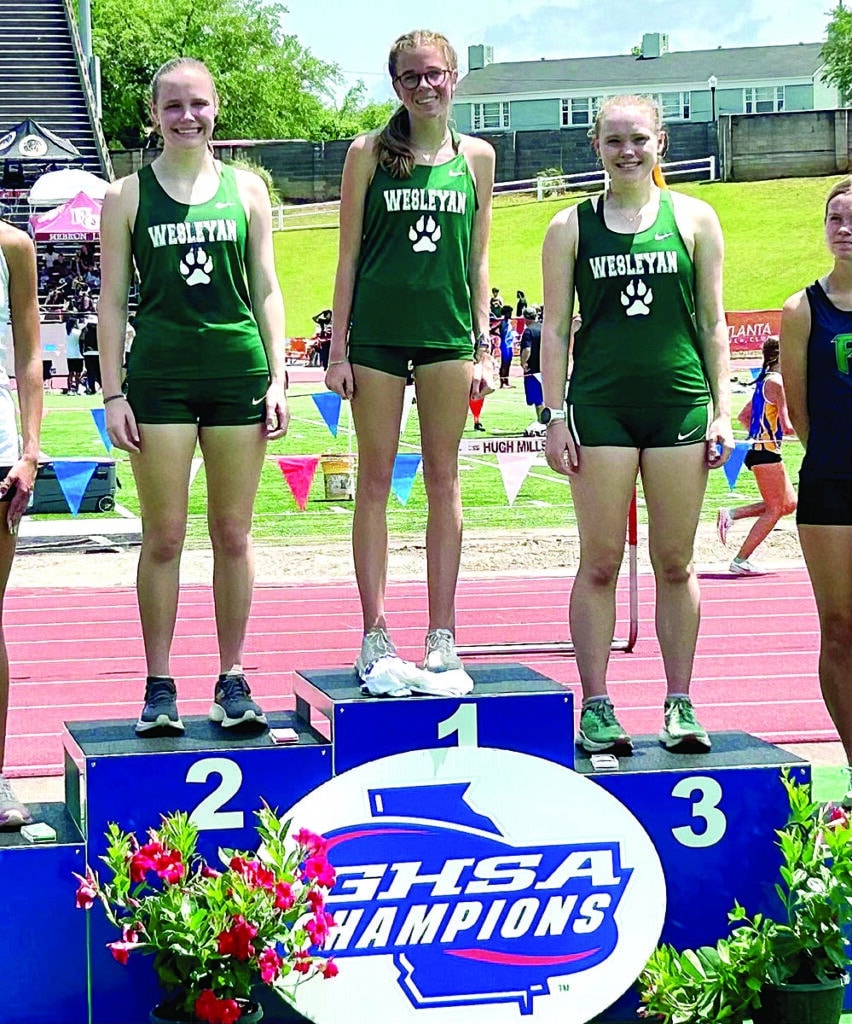
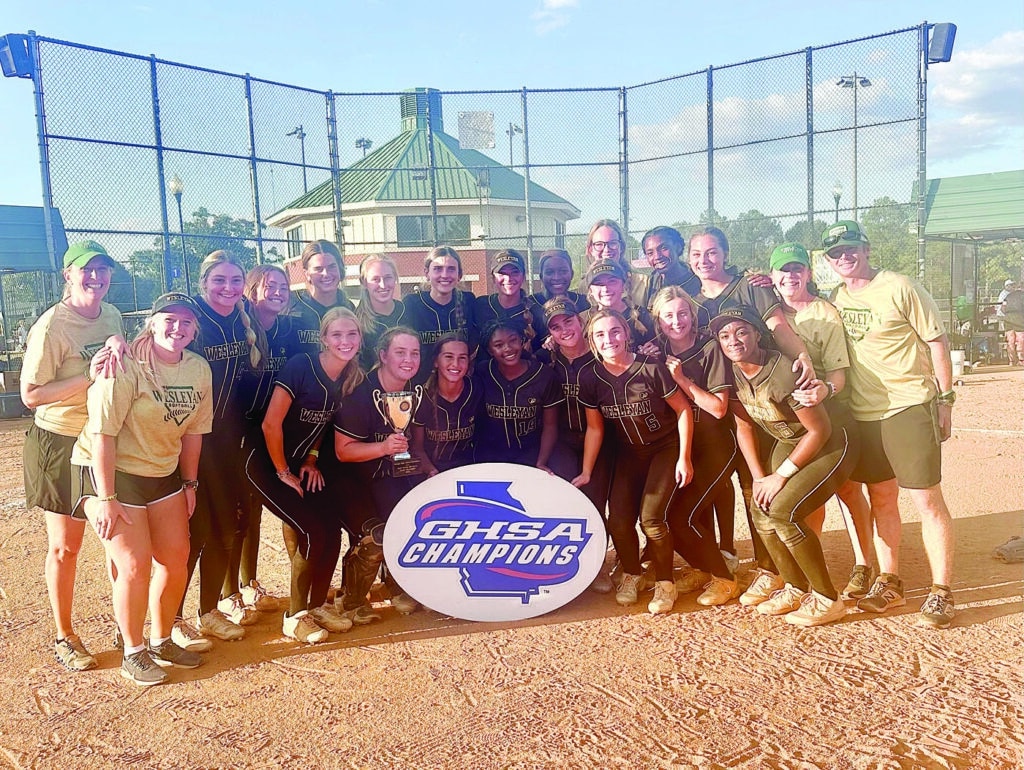
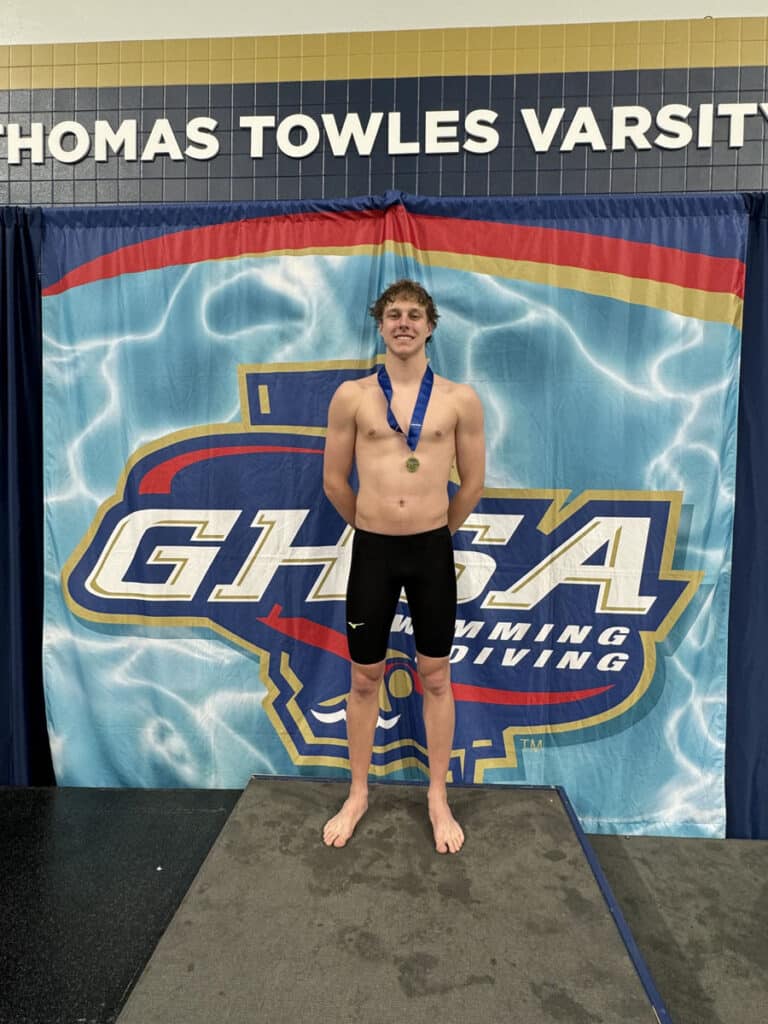
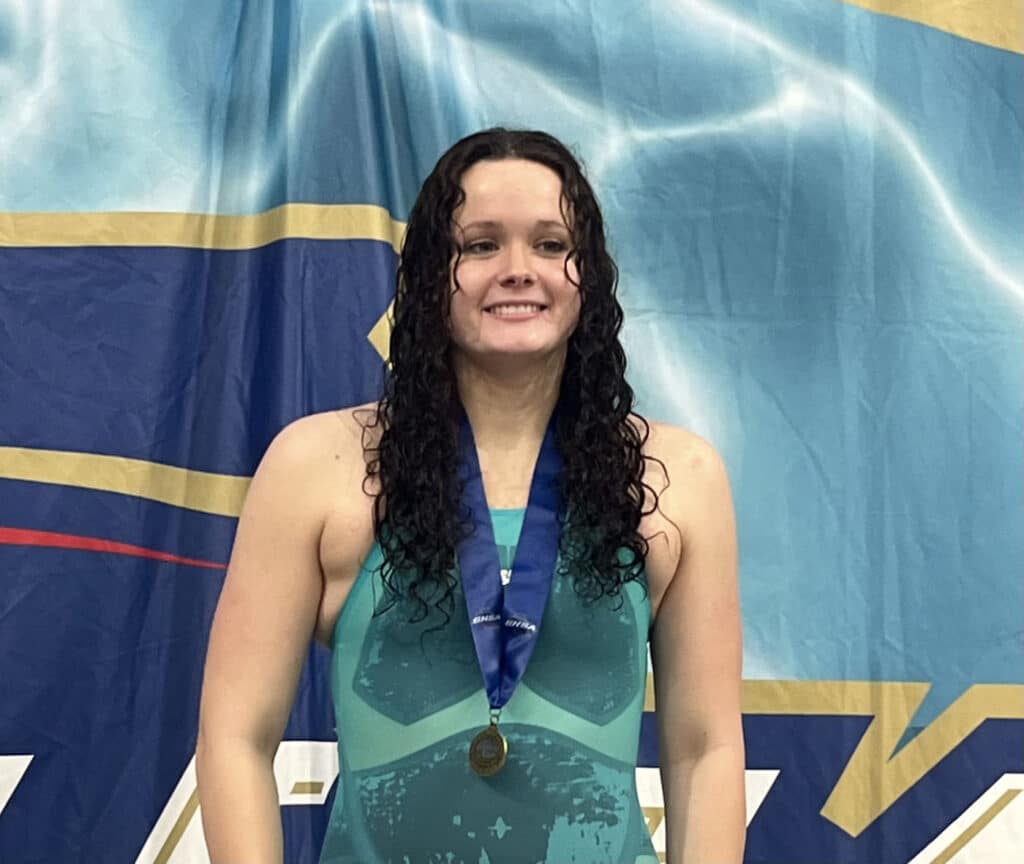
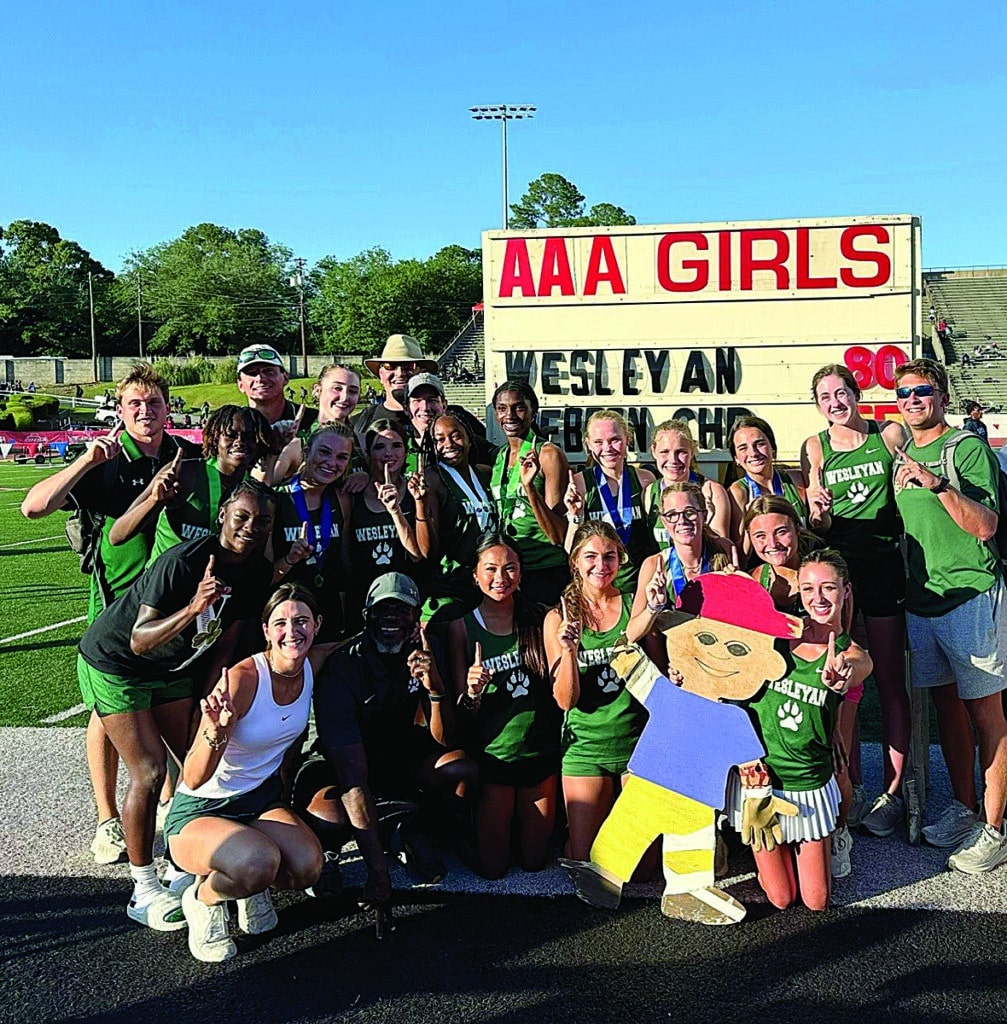
“While winning a state championship is a substantial accomplishment that is worthy of celebration, it is not the sole measure by which we measure the success of a season. It is our greatest desire and prayer that the lives of our students will be transformed due to the investment by our coaches and through the relationships they build with their teammates,” added Cleveland.
After the girls and boys lacrosse teams won their state titles earlier this year, Wesleyan now has a state championship in every sport they field.
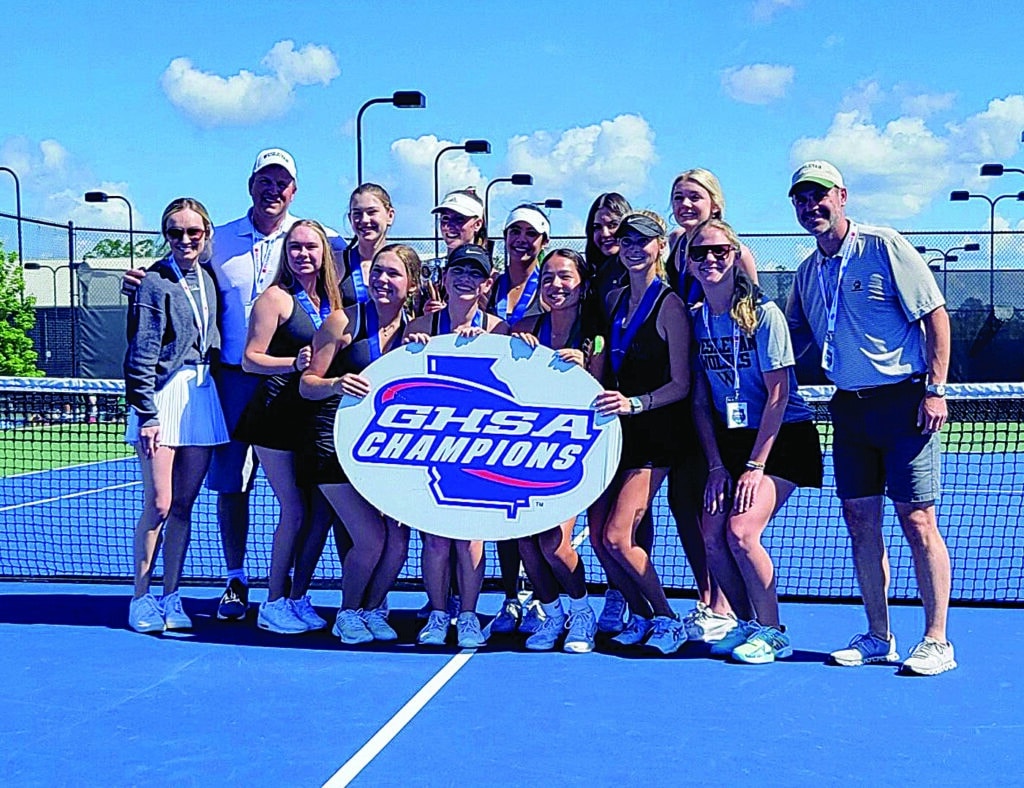
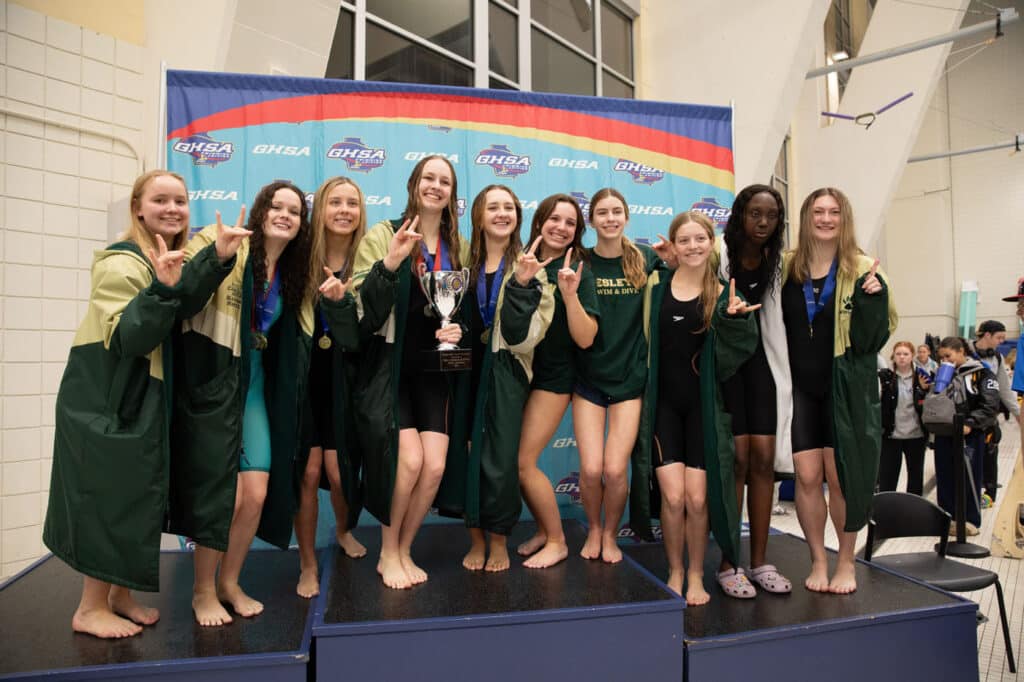
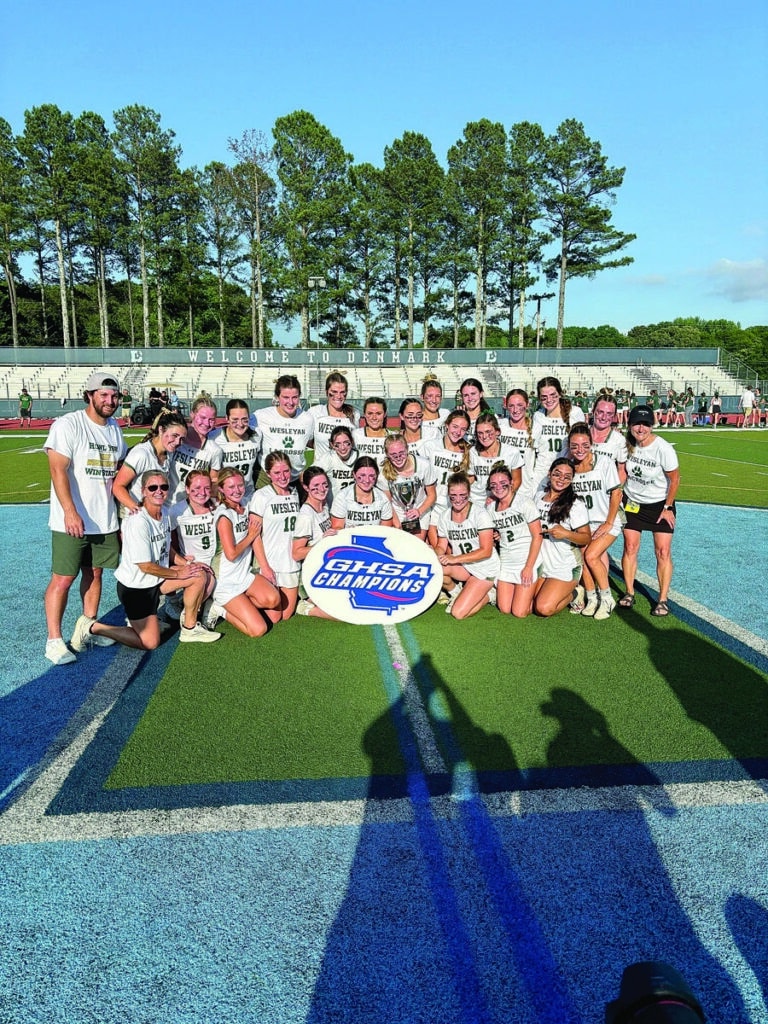
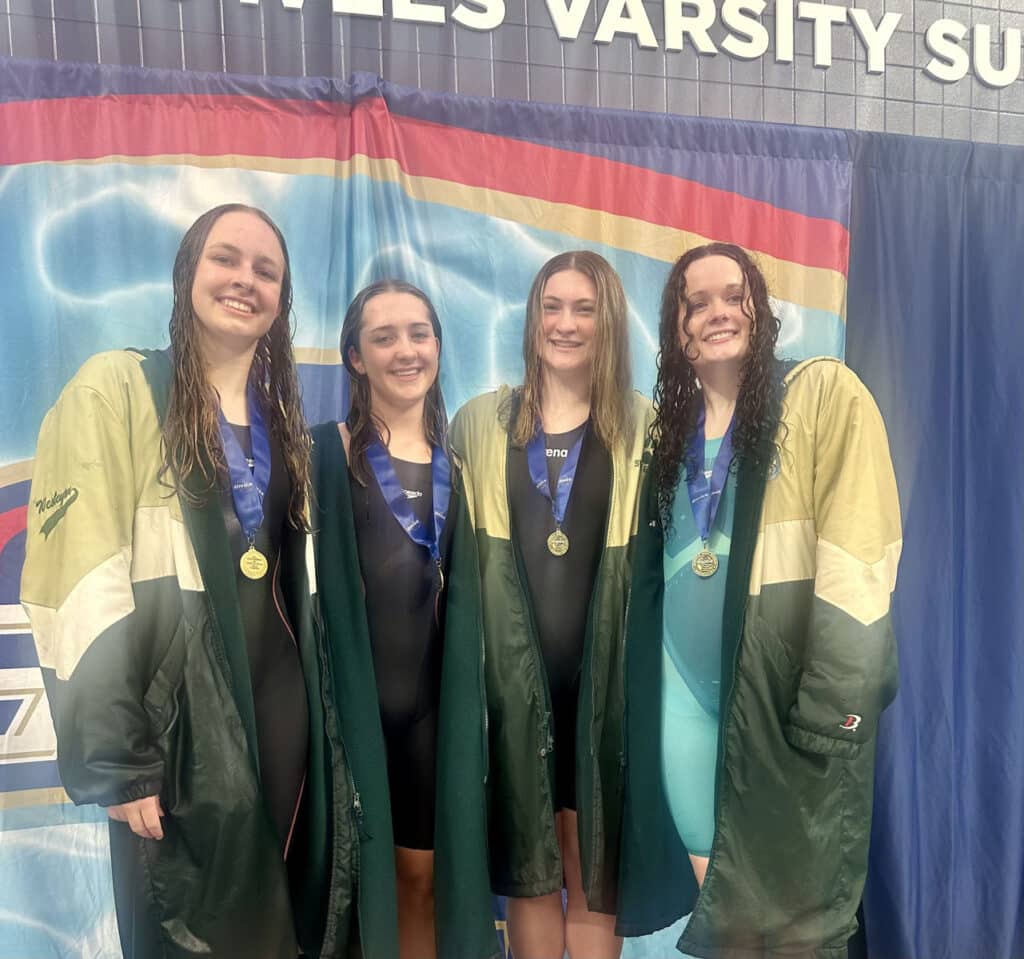
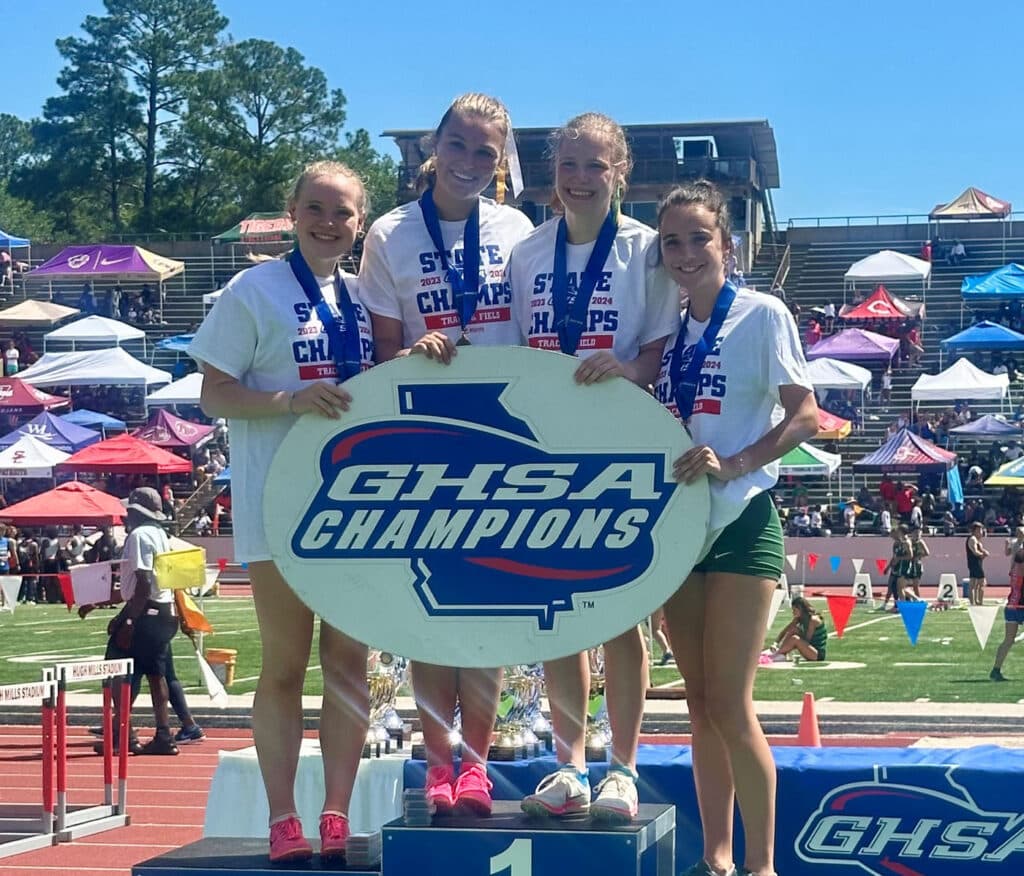
“We are so proud of our student-athletes, coaches, and our entire athletics program. Regardless of the number of state championships in a given year, our goal is to develop young men and young women of character. When recognition like state titles accompanies that objective, it certainly is a lot of fun and a great honor for our entire community,” commented Lacy Gilbert, director of athletics.
Congratulations to all Wesleyan student-athletes, coaches and faculty for this incredible accomplishment.
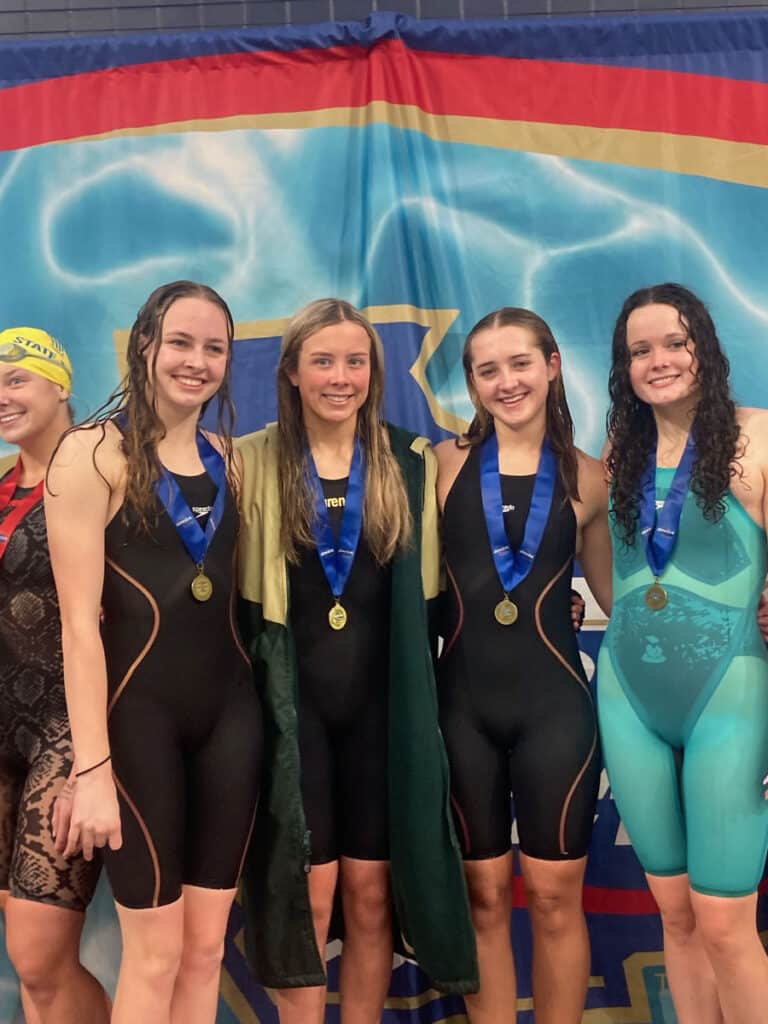
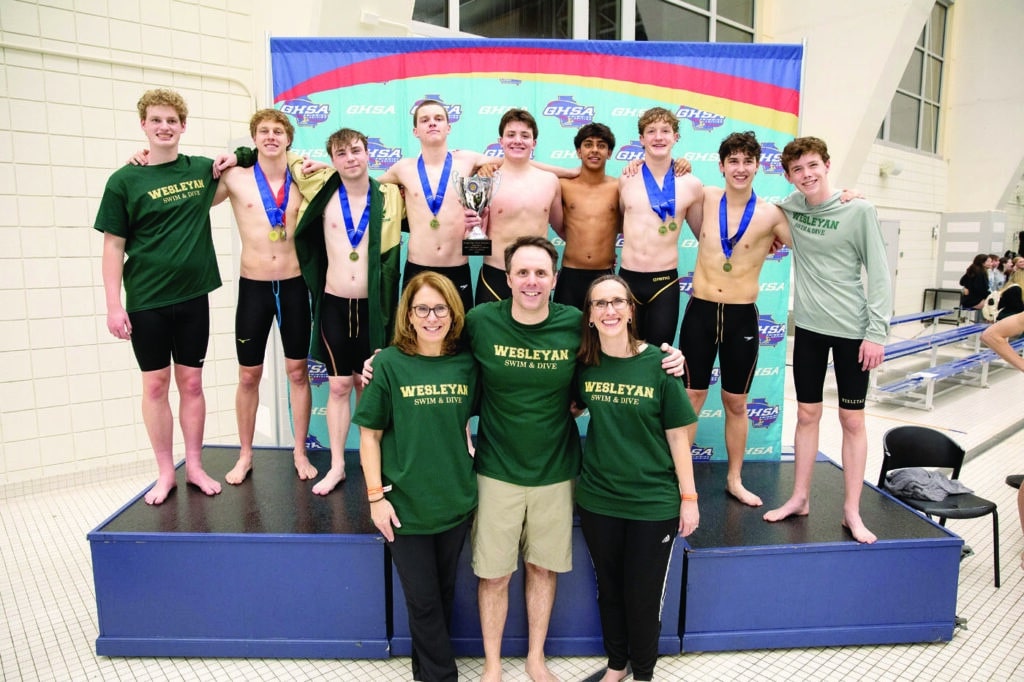
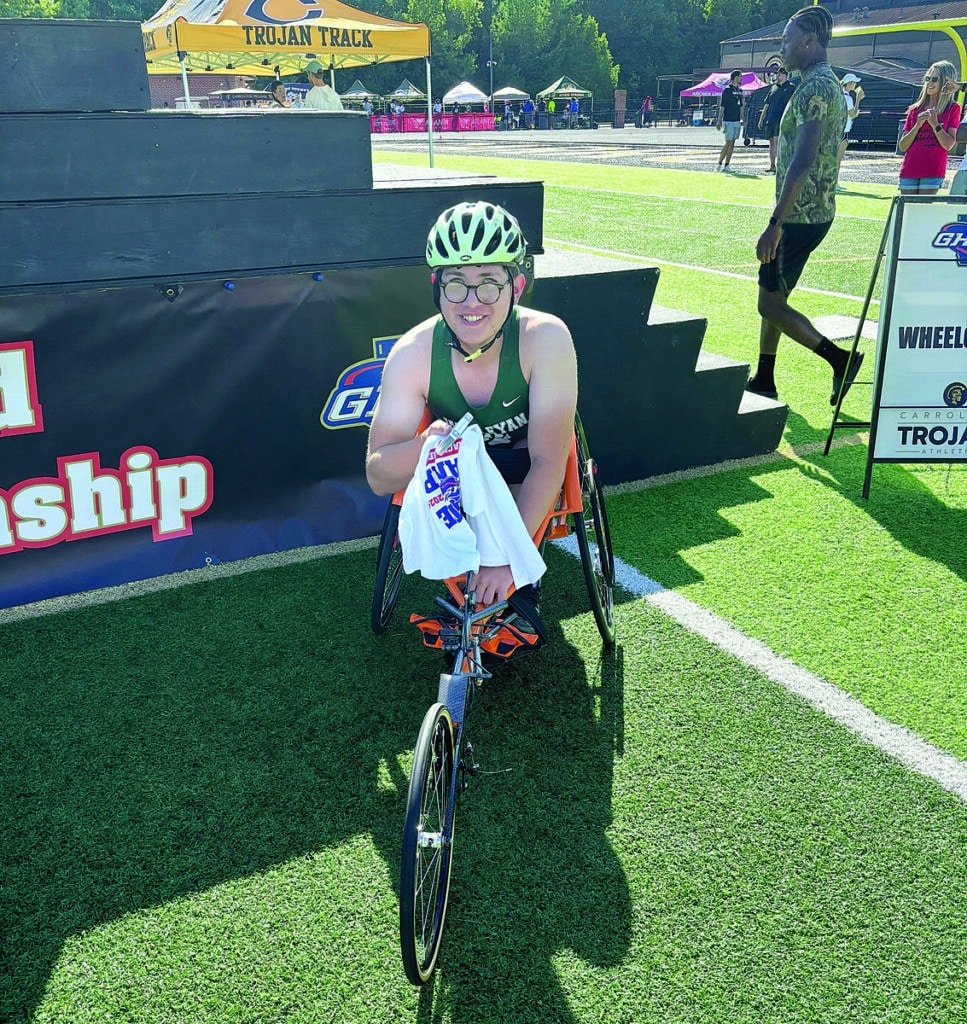
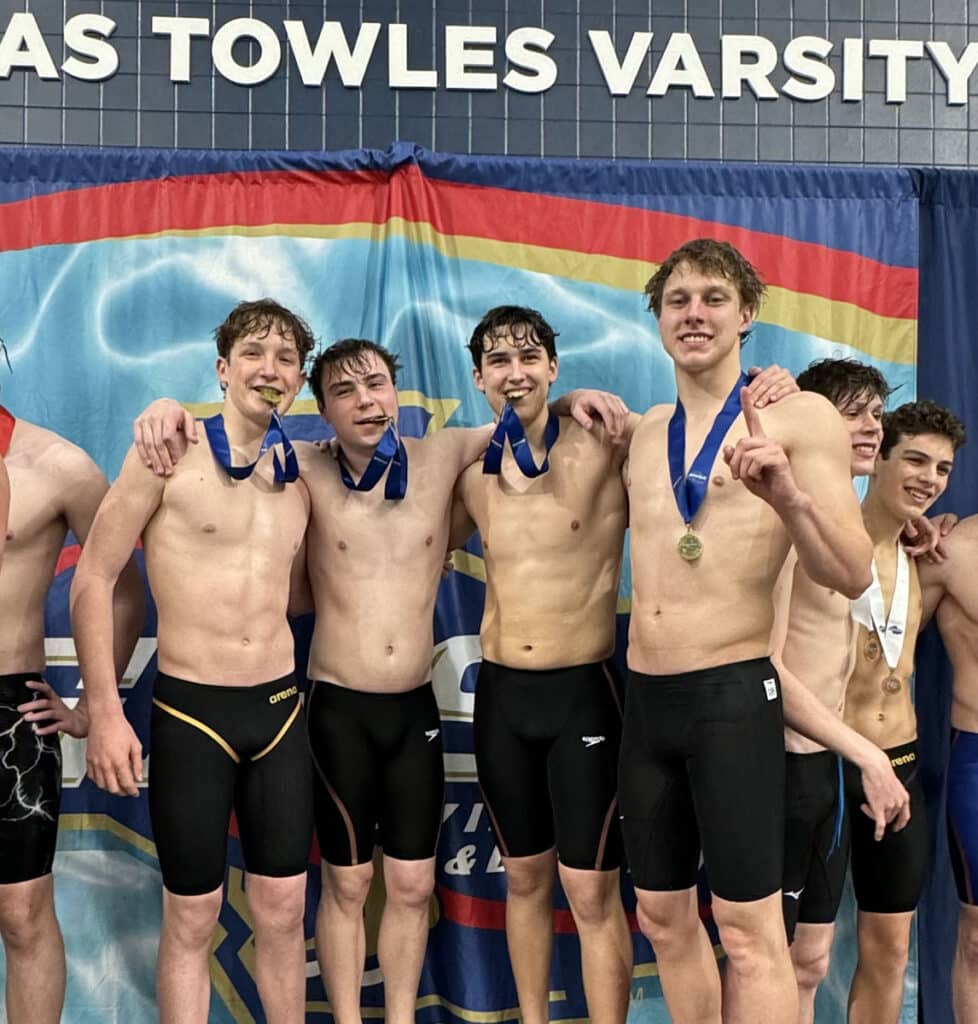
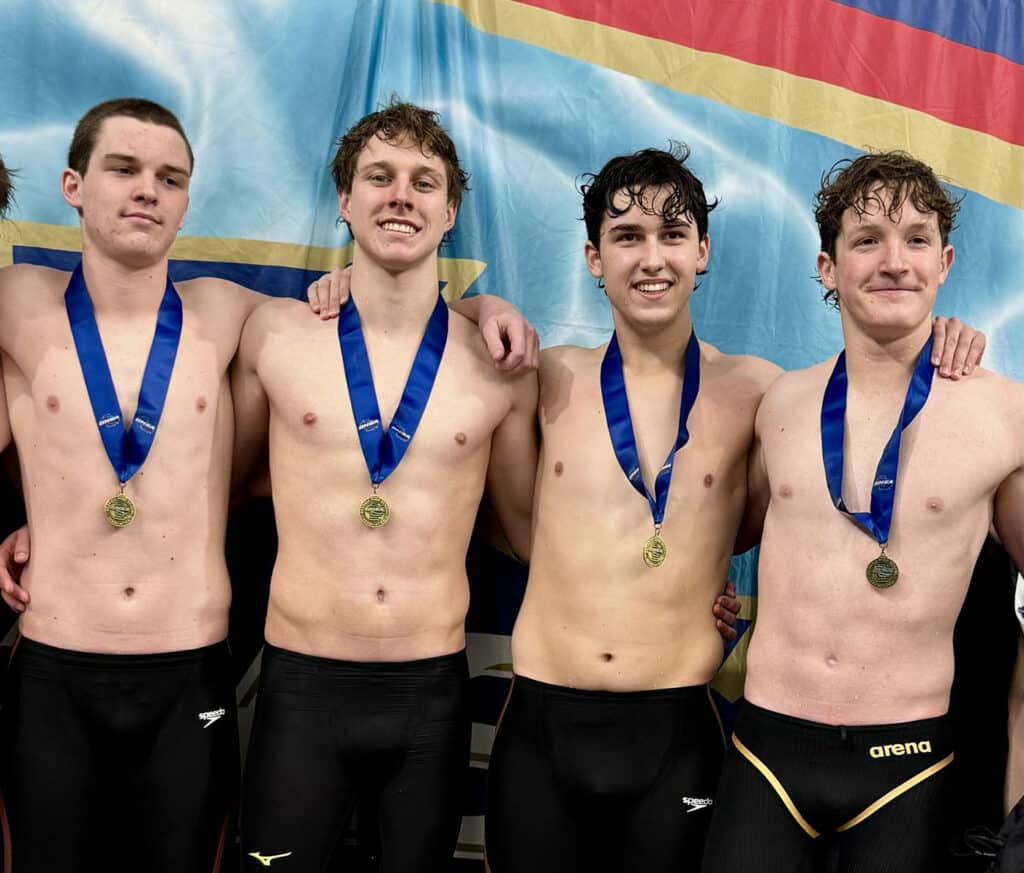
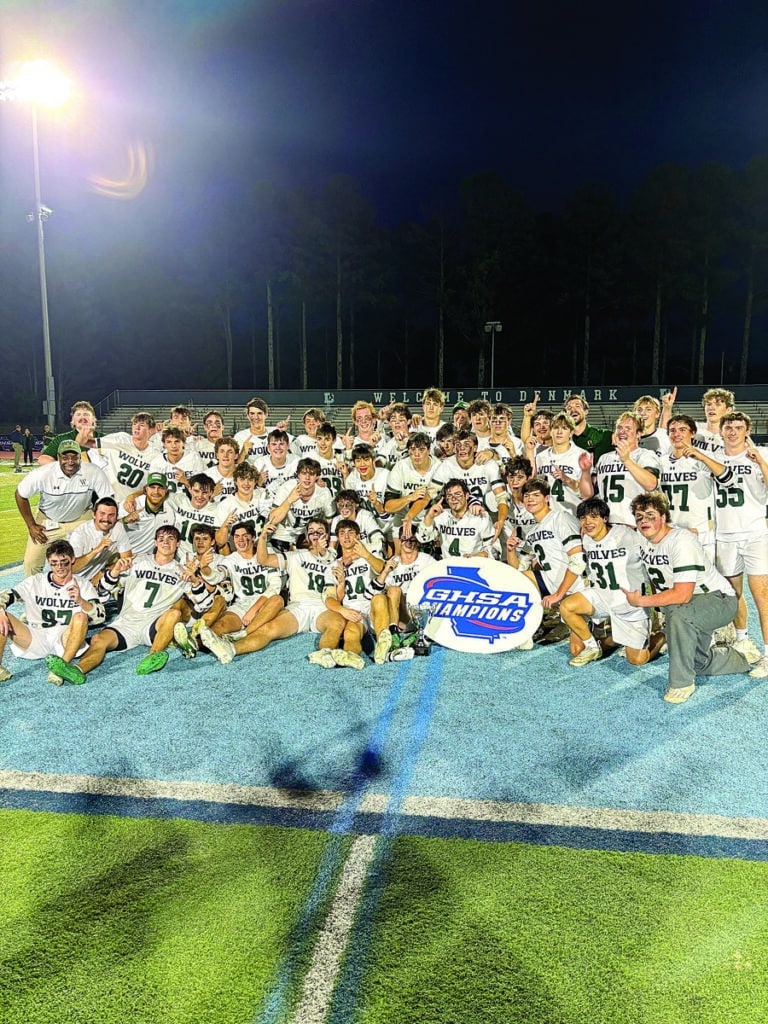
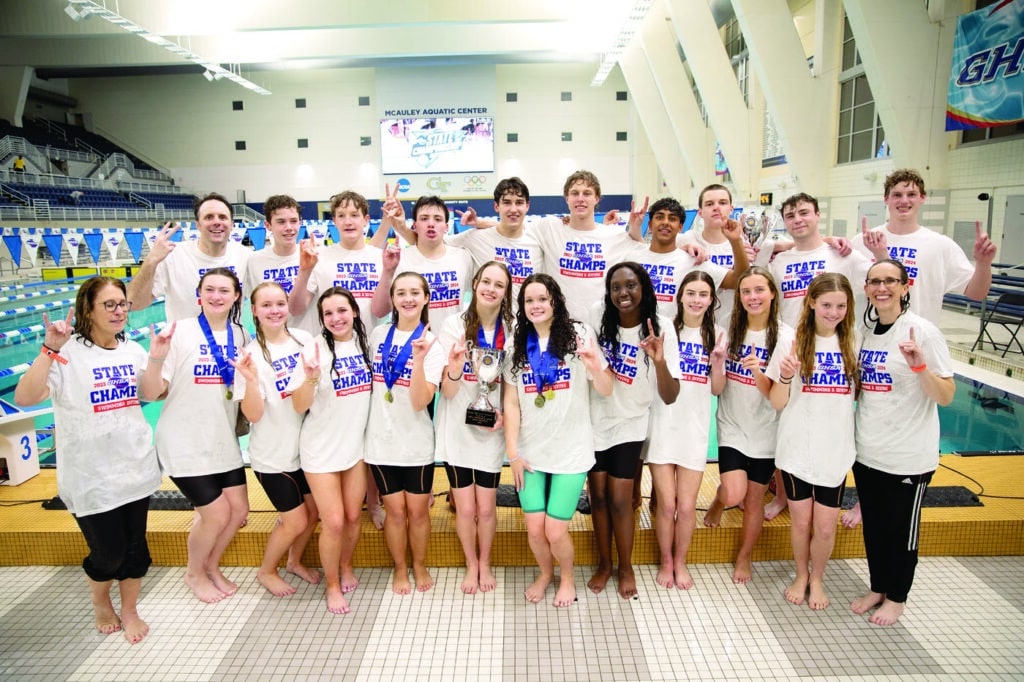
List of team titles:
- Girls Softball
- Girls Cross Country
- Boys Swim & Dive
- Girls Swim & Dive
- Girls Lacrosse
- Boys Lacrosse
- Girls Tennis
- Girls Track & Field
- Boys Golf
List of individual titles:
- Weezie Moore – Girls Cross Country
- Abbey Suits – Dive
- Hattie Wasmuth – Swim: 200 Medley
- Max Perry – Swim: 50 Free
- Ryan Cowart, Jace Neeb, JJ Neeb and Max Perry – Swim: 200 Free Relay
- Ansley Chapman, MC Harrison, Vivian Hosier and Hattie Wasmuth – Swim: 200 free relay
- Ryan Cowart, JJ Neeb, Max Perry and Connor Worgo – Swim: 400 free relay
- Ansley Chapman, Lily Corbitt, Vivian Hosier and Hattie Wasmuth – Swim: 400 free relay
- Weezie Moore – Track & Field: 3,200 meters
- Kyra Brubaker, Ansley Voss, Eva Murphy and Julie Anne Bush – Track & Field: 4 x 800-meter relay
- Anne McSweeney – Track & Field: 800 meters
- Ben Vondrak – Track & Field: Wheelchair 800 meters and 200 meters
Related
Sports
The ALTA Foundation Announces the 2024 L. Keith Wood Scholarship Award Winners
Published
3 months agoon
May 10, 2024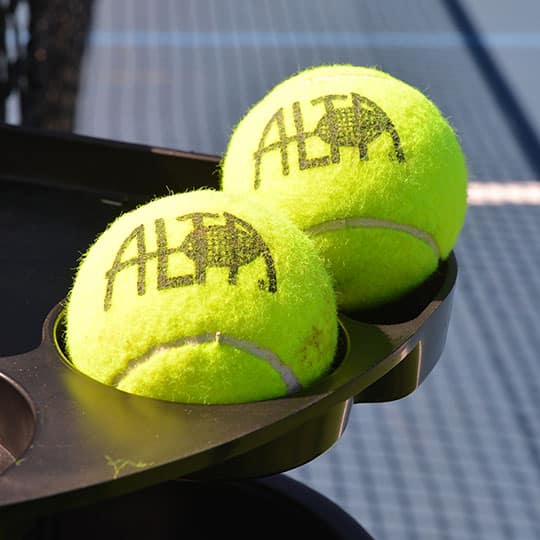
Congratulations to the eight well-deserving recipients who will receive this year’s L. Keith Wood Scholarship award winners scholarship. ALTA Foundation committee members reviewed numerous applications from exceptionally talented, intelligent and community focused students to make their decisions.
To qualify for this award, candidates must have engaged in either the ALTA Junior League, participated in the Junior Challenge Ladder, or been involved in the Foundation’s START program. They had to have shown a dedication to community and volunteer service along with being able to display how tennis has assisted with their growth, both on and off the court.
Each awardee will be granted a $2,500 scholarship to support their educational endeavors and will be honored on center court during ALTA Day on July 22 at the Atlanta Open.
Here are the winners:
Isabelle Coursey – Atlanta, GA
ALTA Facility: Dekalb Tennis Center
Graduate of: Chamblee High School
Attending: Georgia Tech
Riley Hamrick – Peachtree Corners, GA
ALTA Facility: Peachtree Station Swim and Tennis
Graduate of: Norcross High School
Attending: University of Georgia
Athena Misewicz – Dunwoody, GA
ALTA Facility: Dunwoody Country Club
Graduate of: Dunwoody High Schoolz
Attending: University of Georgia
Prisha Mody – Johns Creek, GA
ALTA Facility: Peachtree Station
Graduate of: Johns Creek High School
Attending: University of Georgia
Mara Opre – Suwanee, GA
ALTA Facility: Sharon Springs Park
Graduate of: Lambert High School
Attending: Anderson University
Ben Stone – Suwanee, GA
ALTA Facility: Mayfair/ St. Clair
Graduate of: Lambert High School
Attending: University of Alabama
Ally Turnbough – Snellville, GA
ALTA Facility: Briscoe Park
Graduate of: Greater Atlanta Christian School
Attending: Clark Atlanta University
Davis Wall – Duluth, GA
ALTA Facility: Canterbury Woods
Graduate of: Peachtree Ridge High School
Attending: University of Georgia
Related
Sports
Peachtree Corners Gets Pole Position in Speed Week 2024
Published
4 months agoon
April 1, 2024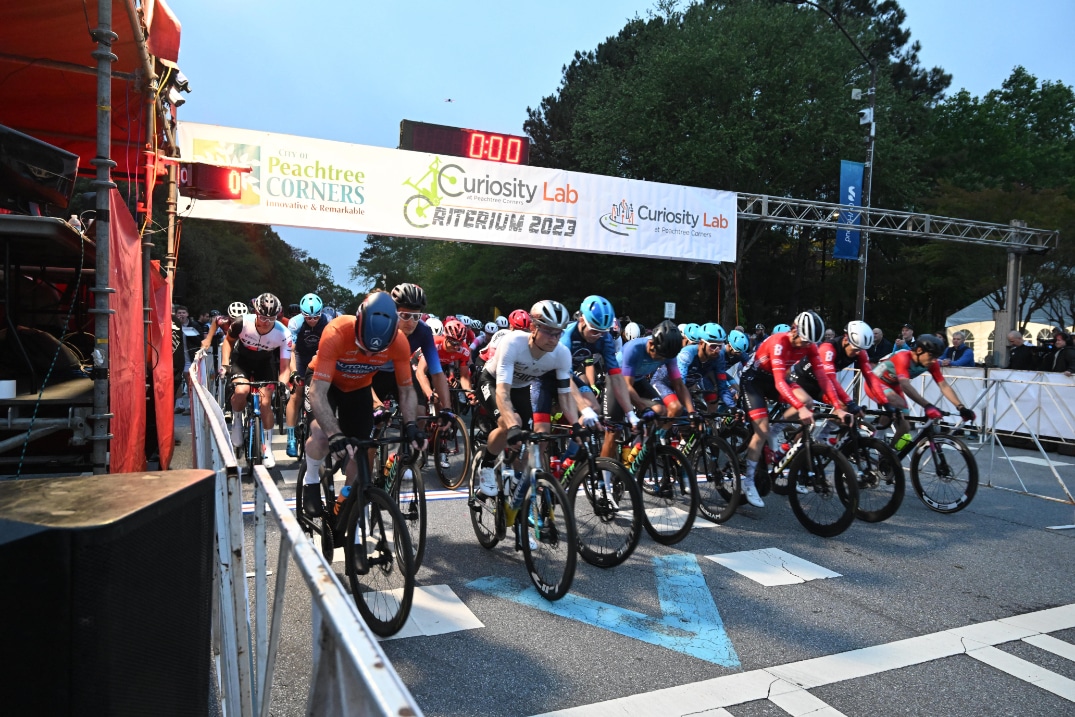
The first Curiosity Lab Criterium took place last year on a cold, rainy day, but the weather didn’t dampen enthusiasm for the event.
The collection of Speed Week criteriums in Georgia and South Carolina kicks off Thursday, April 25, in Greenville, SC, and wraps up on Sunday, May 5, in College Park, GA.
Peachtree Corners has added many new components this year, including a Sunday time slot.
“It was a good opportunity for us to get a feel for it,” said Louis Svehla, the city’s communications director. “[We got to see] how it would work in the setup and stuff like that.”
This year’s event will also feature a running race, races for kids, food trucks, vendors and other activities for the family.
Speed Week is a premiere event on the U.S. Pro Cycling Circuit that draws cyclists worldwide, including Olympic medalists and world and national champions. In 2023, the professional men’s and women’s events drew cyclists from over 30 states and more than 20 countries.
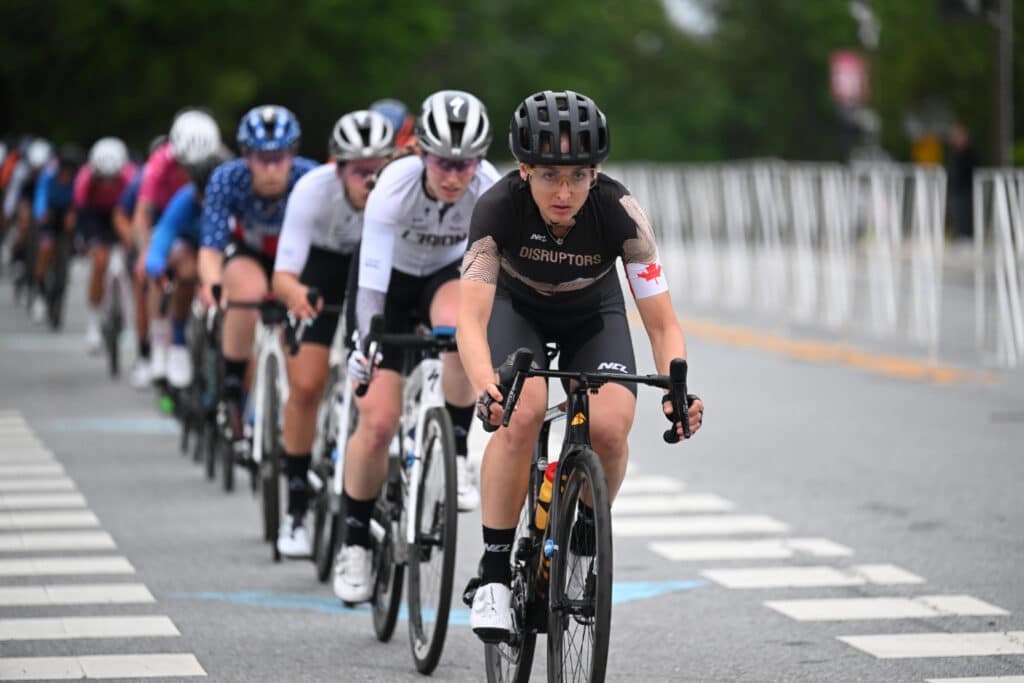
Gearing up for race day
The 2024 Curiosity Lab Criterium will take place on a course in the world-famous Curiosity Lab in Peachtree Corners, a 5G-enabled, 500-acre living laboratory ecosystem designed specifically as a proving ground for IoT, mobility and smart city technologies.
The Curiosity Lab Criterium will feature an array of innovative technologies currently being deployed to help protect vulnerable road users (VRUs). This event will also showcase the VRU technology of tomorrow as exhibited by private sector V2X companies and sensor innovators, OEMs hardware and software manufacturers, government officials, bike companies, advocacy groups and more.
“Despite it being a dreary day in the middle of the week last year, the public showed up and had a good time,” Svehla said.
“We always want people to gather and hang out with each other, especially when these events are free and really for them,” he added.
“For our first one, we were very happy with the turnout. … The vendors and the food trucks we hired for the event made their minimums, so they didn’t cost the city any money,” he explained.
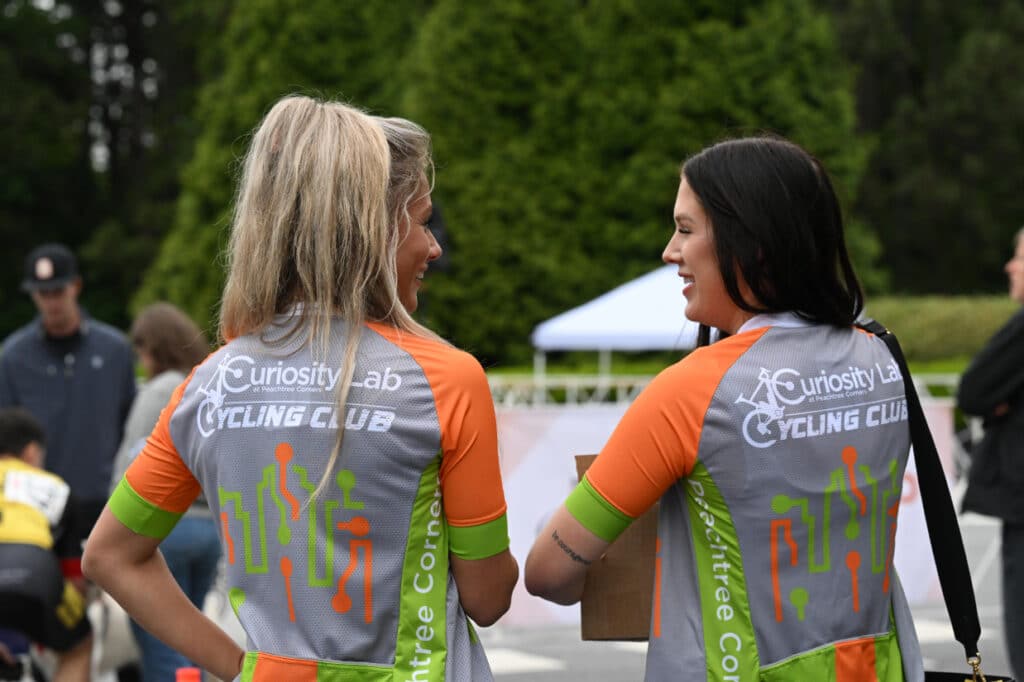
Even better than last year
Event producers, sponsors and race teams also gave great feedback.
“They were ecstatic about this course. They absolutely loved it because it’s unlike any other course they have on this circuit,” he said. “They love that there were elevation changes and … it was in a different type setting, not just on a city street like others.”
The success of that first year prompted the promoters to move this year’s race to a Sunday, a weekend race. It’s the day after the Athens race and the second one in Georgia.
“It’s not really far distance,” Svehla added. “And because of that, we expect to have more professional riders, both in the men’s and women’s professional divisions. And we’re hoping that also boosts the amount of … third tier riders that are amateurs but want to compete.”
“Last year’s races started at 3 p.m., and I think the last race went off at 9 p.m.,” he said. “This year, we are starting at 10 in the morning.”
The last race starts at 8 p.m. and lasts about an hour. In between, there are several junior categories for kids from 9 to 14 years old, a 130-yard race for little kids ages 5 to 9, a foot race and many family-friendly activities.
“Although the bike races are open to whoever registers, the running races are invitational only,” Svehla said.
“They’re inviting some of the best runners from the Southeast,” he said. These people are going to run a sub-six-minute mile, minimum.”
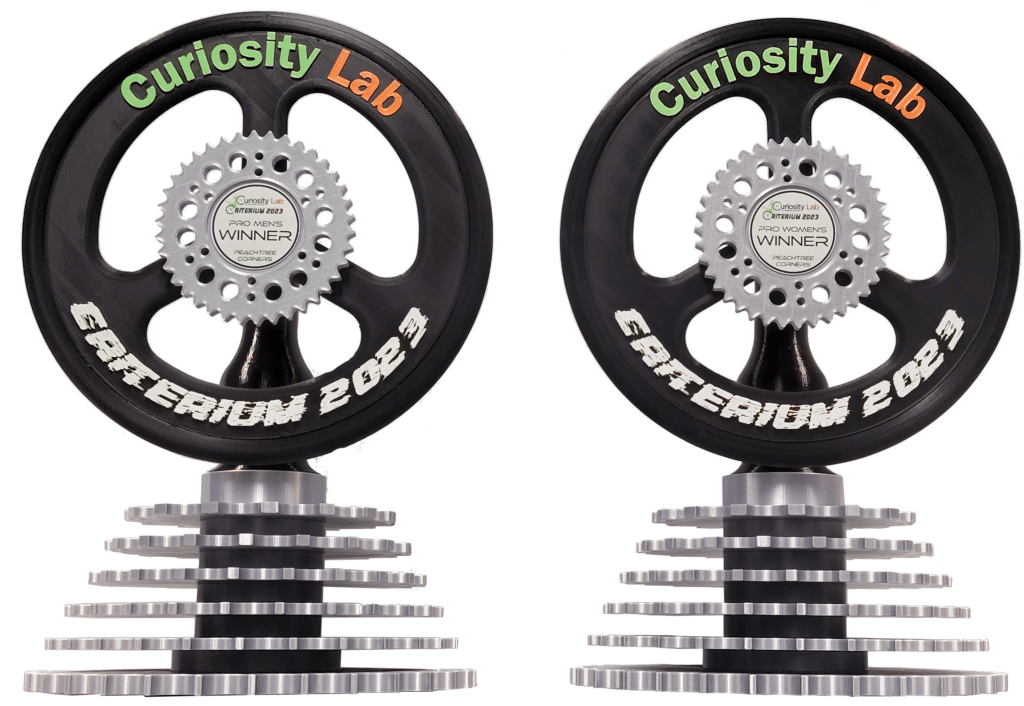
Taking home the gold
Last year’s custom 3-D printed trophies for the professional men and women competitors will be replicated in smaller trophies and medals for the amateur racers.
The design is the same as last year, but the spokes on the wheel are gold. Local company ZhumeisterLabs (ZLabs3D) will be making the trophies.
In addition to being a fun, family-focused event, Curiosity Lab Criterium is also a chance to showcase the best of Peachtree Corners.
“[This] allows us to showcase Curiosity Lab, its different technologies and what being an IT city means,” said Svehla.
“We also want to be a leader in working with companies to provide solutions that make being on the road or next to the roadway as safe as possible. This, hopefully, will encourage more cycling, walking, running and multi-use trails.”
Curiosity Lab Criterium 2024
What: U.S. Pro Cycling Circuit Race and Running Race
When: Sunday, April 28
Time: 10 a.m. to 8:30 p.m.
Where: Curiosity Lab at Peachtree Corners City Hall (310 Technology Pkwy)
Learn more about the event at peachtreecornersga.gov/385/Curiosity-Lab-Criterium-2024.
Speed Week Events
April 25 through May 5
Greenville Cycling Classic
Greenville, SC
Thursday, April 25
Spartanburg Regional Healthcare System Criterium
Spartanburg, SC
Saturday, April 27
Athens Orthopedic Clinic Twilight Criterium p/b Michelob Ultra
Athens, GA
Sunday, April 28
Curiosity Lab Criterium
Peachtree Corners, GA
Tuesday, April 30
Spin the District – Union City criterium
Union City, GA
Wednesday, May 1 (non-speed week event)
Bonus! Track racing @ Dick Lane Velodrome
East Point, GA
Friday, May 3
Spin the District – Hapeville Criterium
Hapeville, GA
Saturday, May 4
Lagrange Cycling Classic
Lagrange, GA
Sunday, May 5
Speed Week Finals – Spin the District – College Park Criterium
College Park, GA
Sunday, May 5
Related
Read the Digital Edition
Subscribe
Keep Up With Peachtree Corners News
Join our mailing list to receive the latest news and updates from our team.
You have Successfully Subscribed!

What’s going on at Jones Bridge Park and the Challenges of Urban Development

Taste of Peachtree Corners: PCBA Showcases Local Restaurants

The Forum Gives Sneak Peek of New Eateries and Community Spaces

Southwest Gwinnett Mayors Share Visions for the Future

8 Events Happening In and Around Peachtree Corners This August

Peachtree Corners Shines Bright with Light Up the Corners Glow Race this August

Peachtree Corners Shines Bright with Light Up the Corners Glow Race this August

The Forum Gives Sneak Peek of New Eateries and Community Spaces

8 Events Happening In and Around Peachtree Corners This August

Southwest Gwinnett Mayors Share Visions for the Future

Taste of Peachtree Corners: PCBA Showcases Local Restaurants

What’s going on at Jones Bridge Park and the Challenges of Urban Development

Local Resident Opens AtWork Location in Peachtree Corners

CHRIS 180 Expands its Services into Gwinnett County [Podcast]

Light up the Corners [Video]

Capitalist Sage: Business Leadership in Your Community [Podcast]

Cliff Bramble: A Culinary Adventure through Italy

Top 10 Brunch Places in Gwinnett County

A Hunger for Hospitality

THE CORNERS EPISODE 3 – BLAXICAN PART 1

Top 10 Indoor Things To Do This Winter

The ED Hour: What it takes to Remove Barriers from Education
Peachtree Corners Life
Topics and Categories
Trending
-
Business1 week ago
Taste of Peachtree Corners: PCBA Showcases Local Restaurants
-
Business2 days ago
The Forum Gives Sneak Peek of New Eateries and Community Spaces
-
City Government4 days ago
Southwest Gwinnett Mayors Share Visions for the Future
-
Around Atlanta4 days ago
8 Events Happening In and Around Peachtree Corners This August


